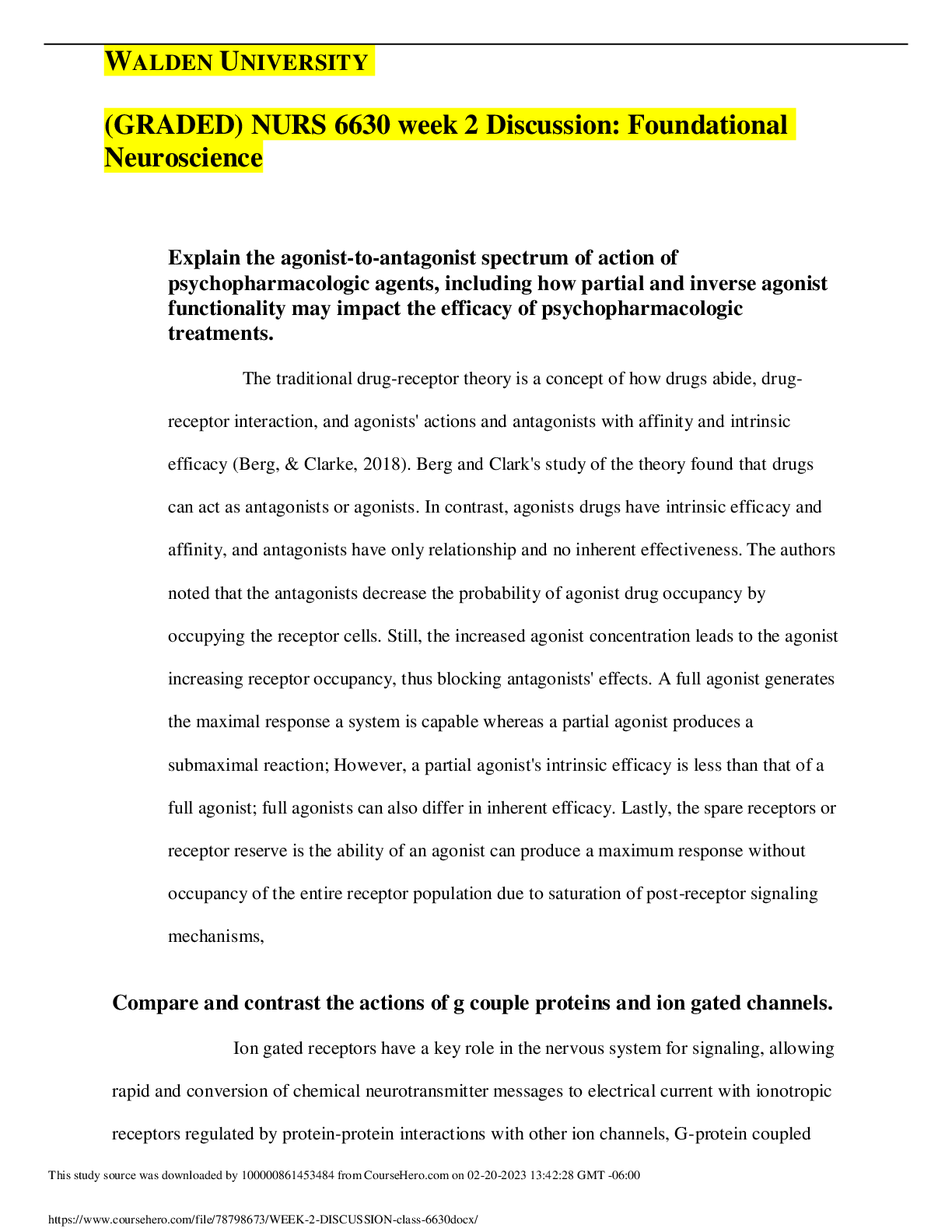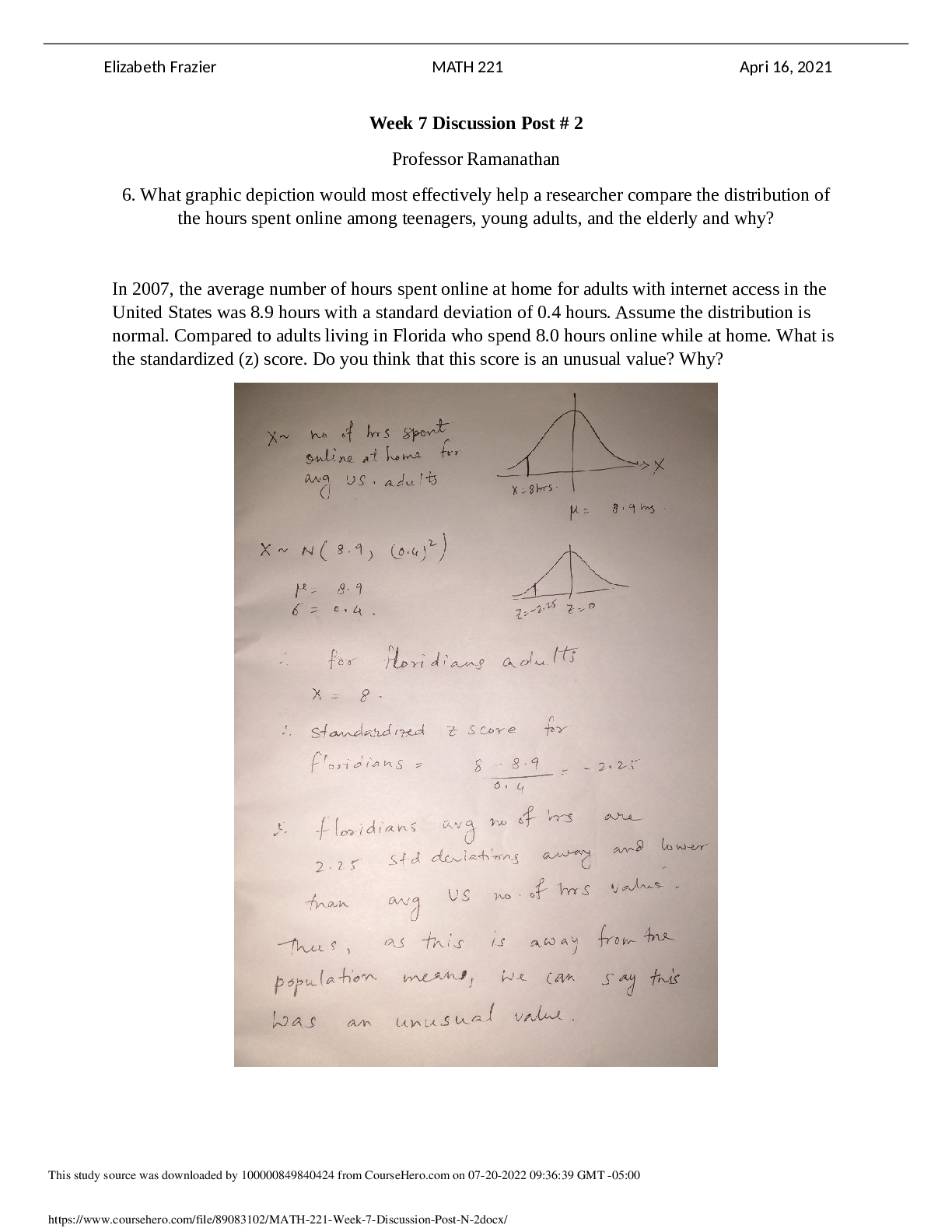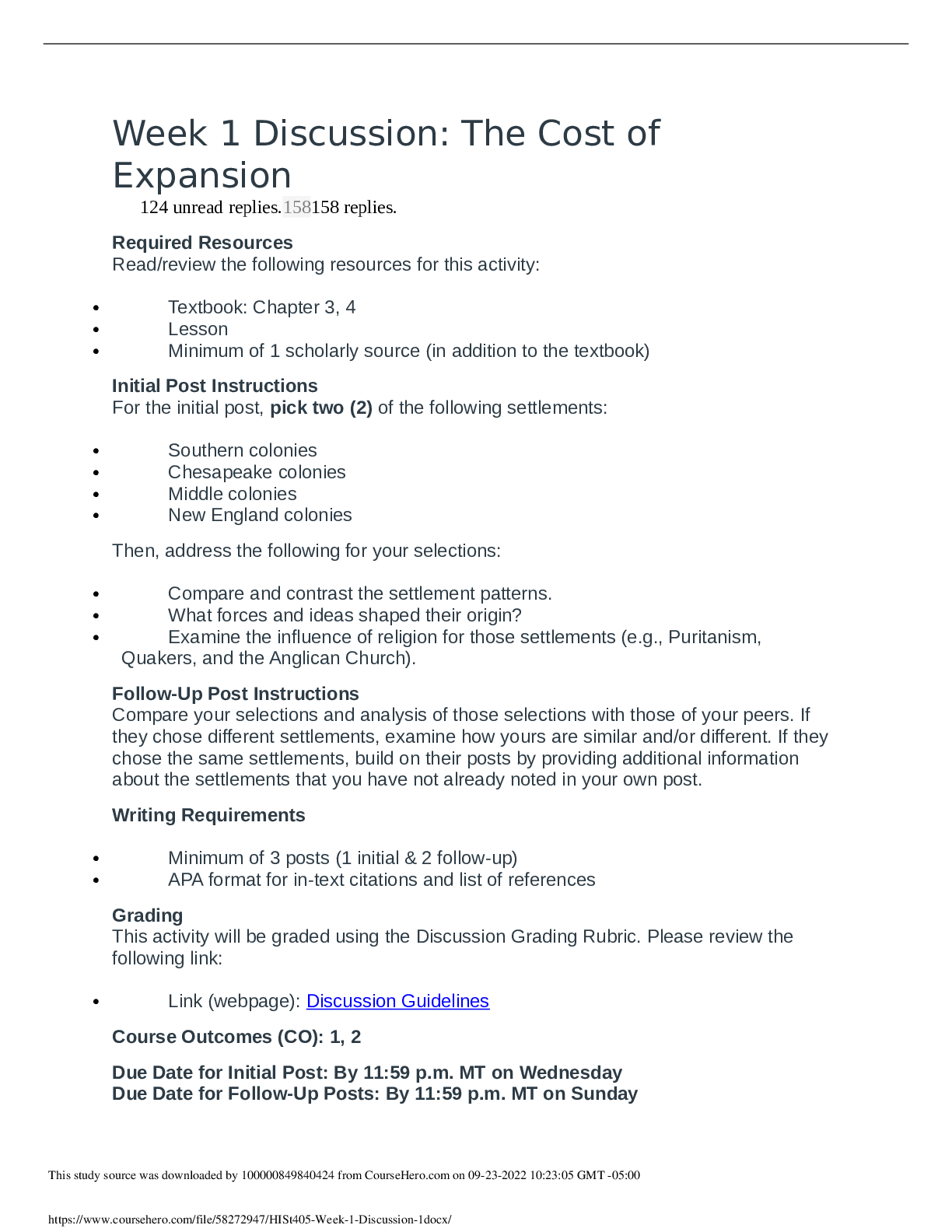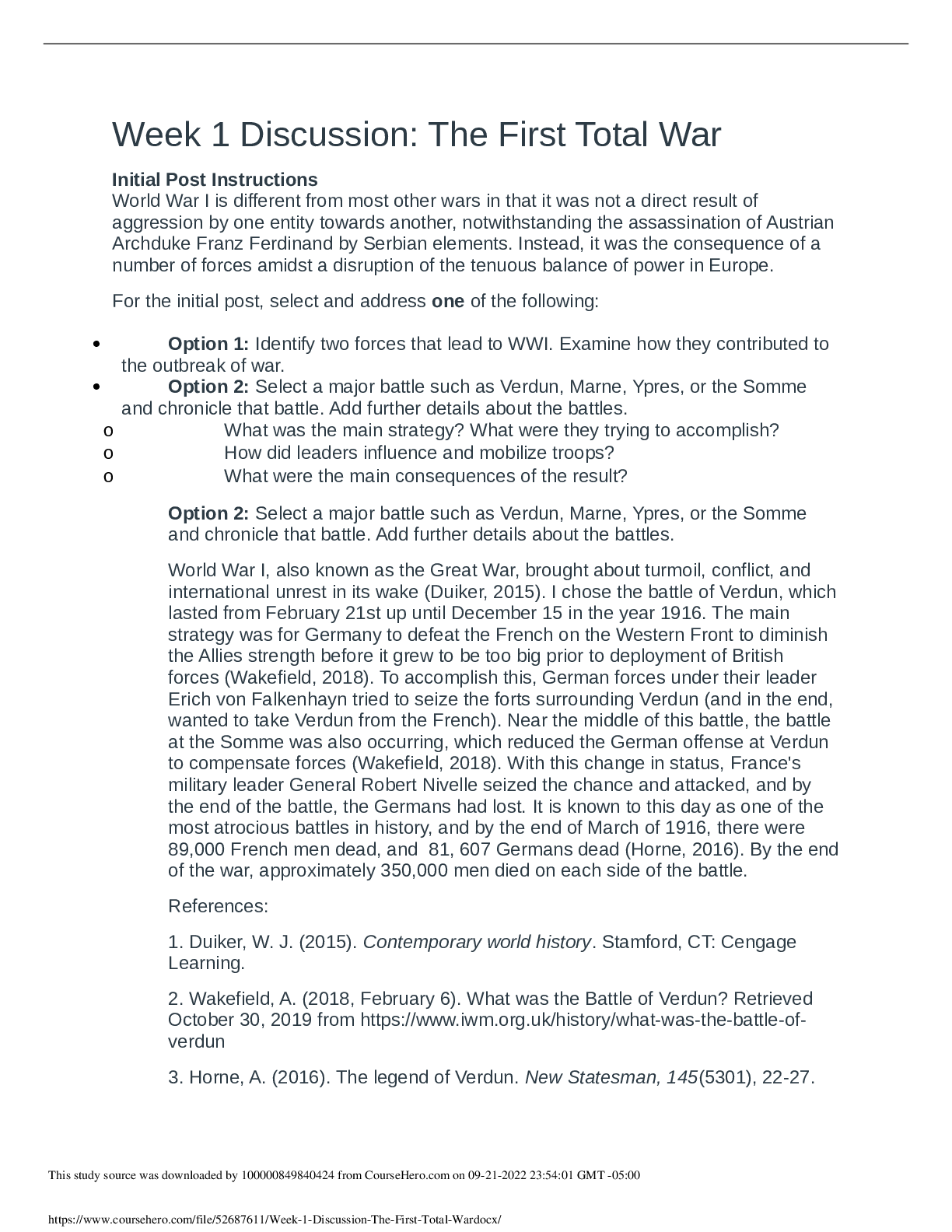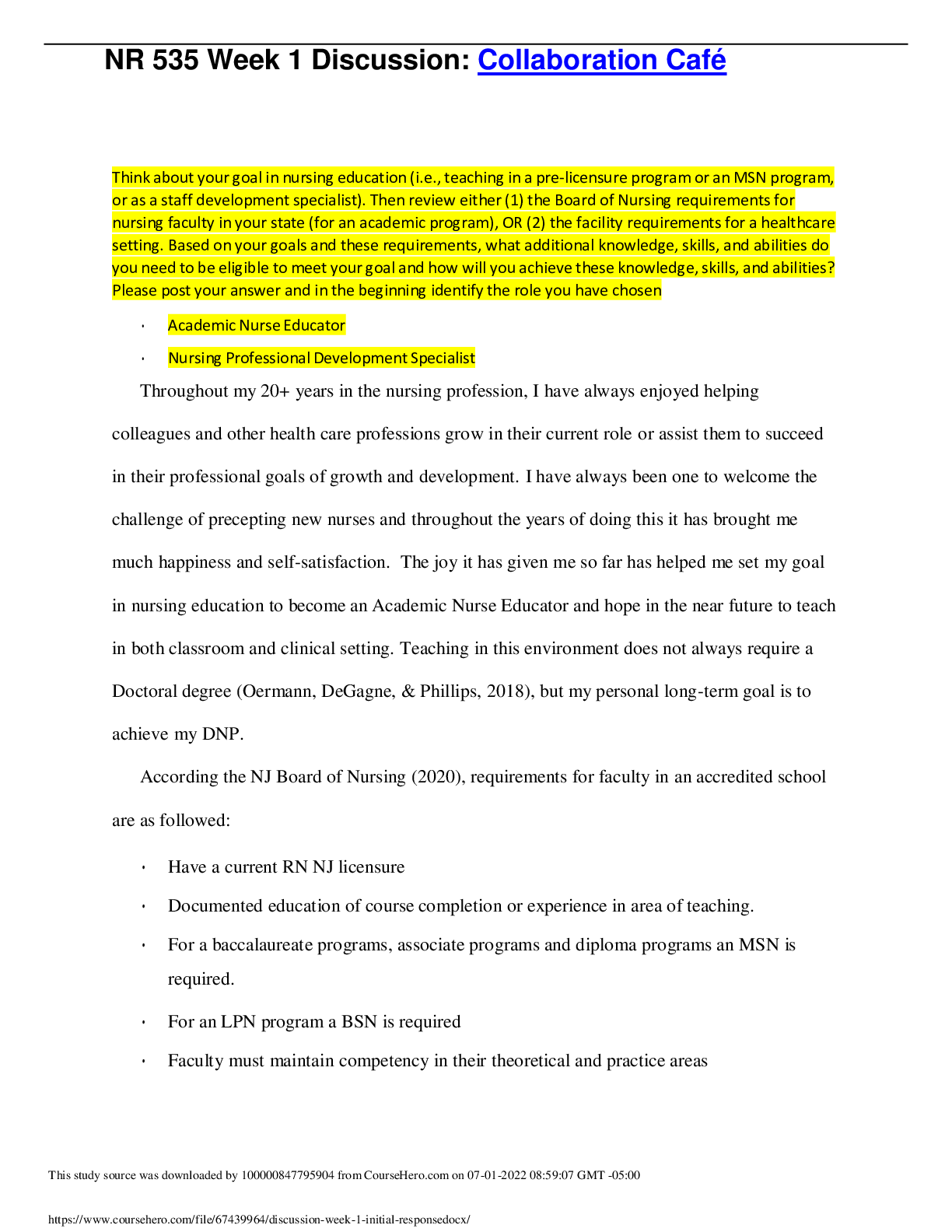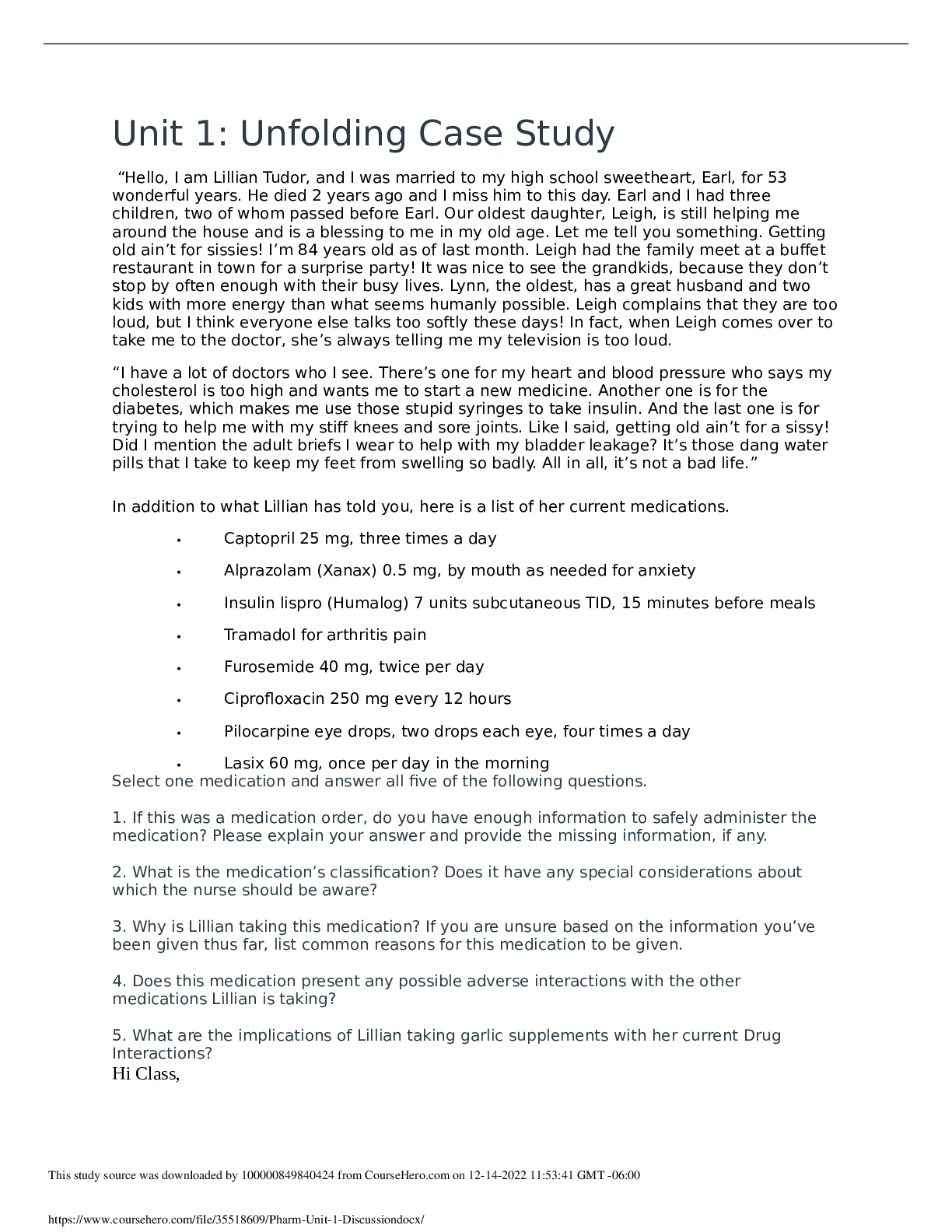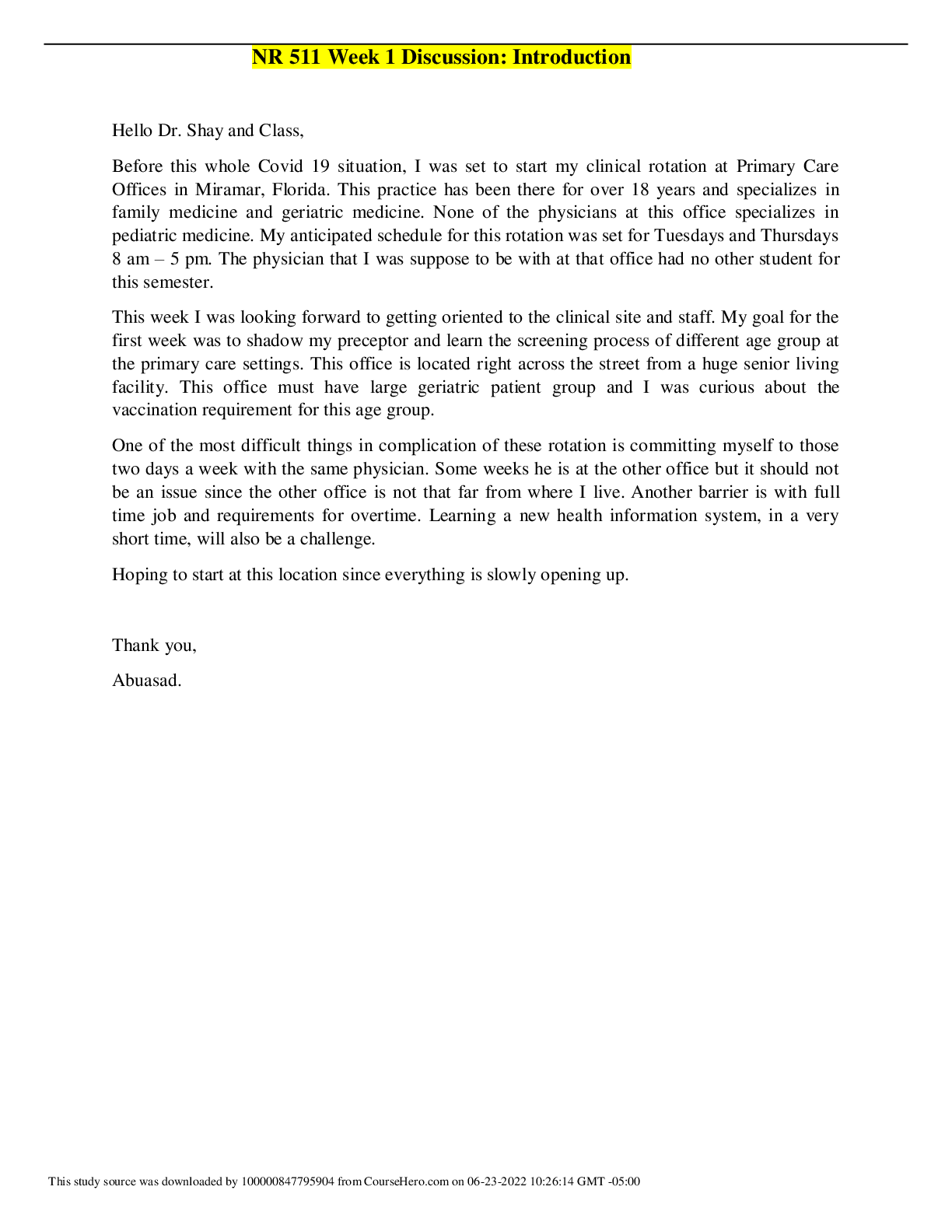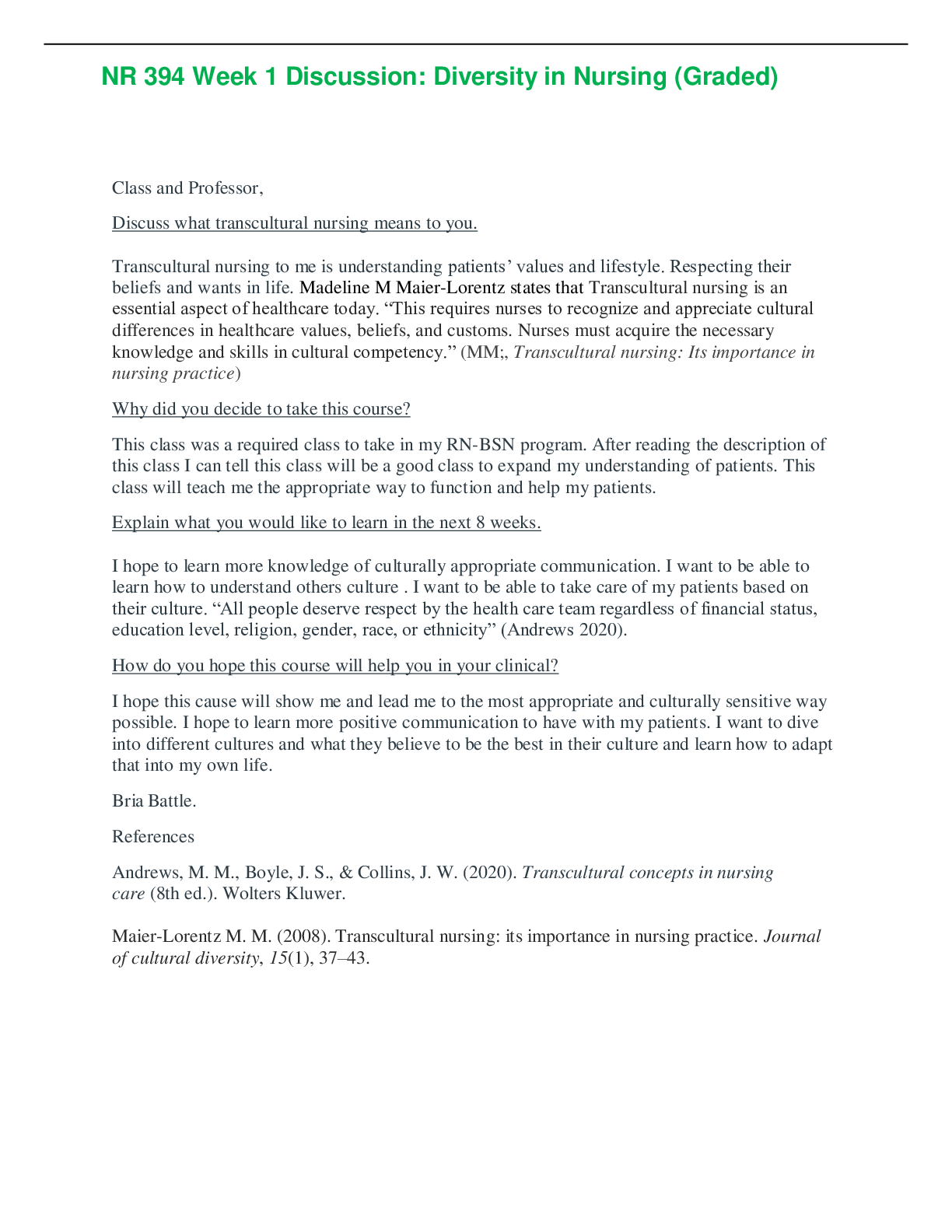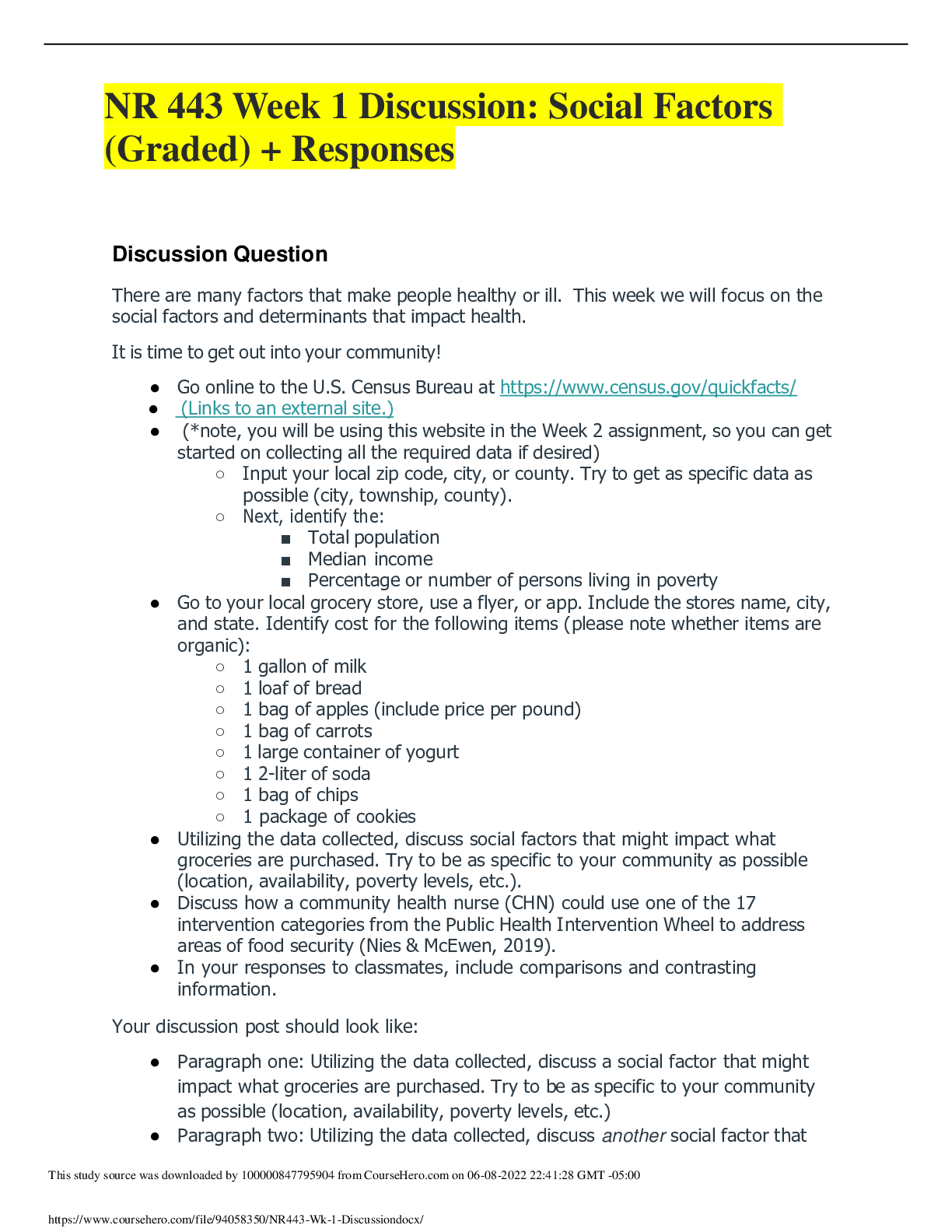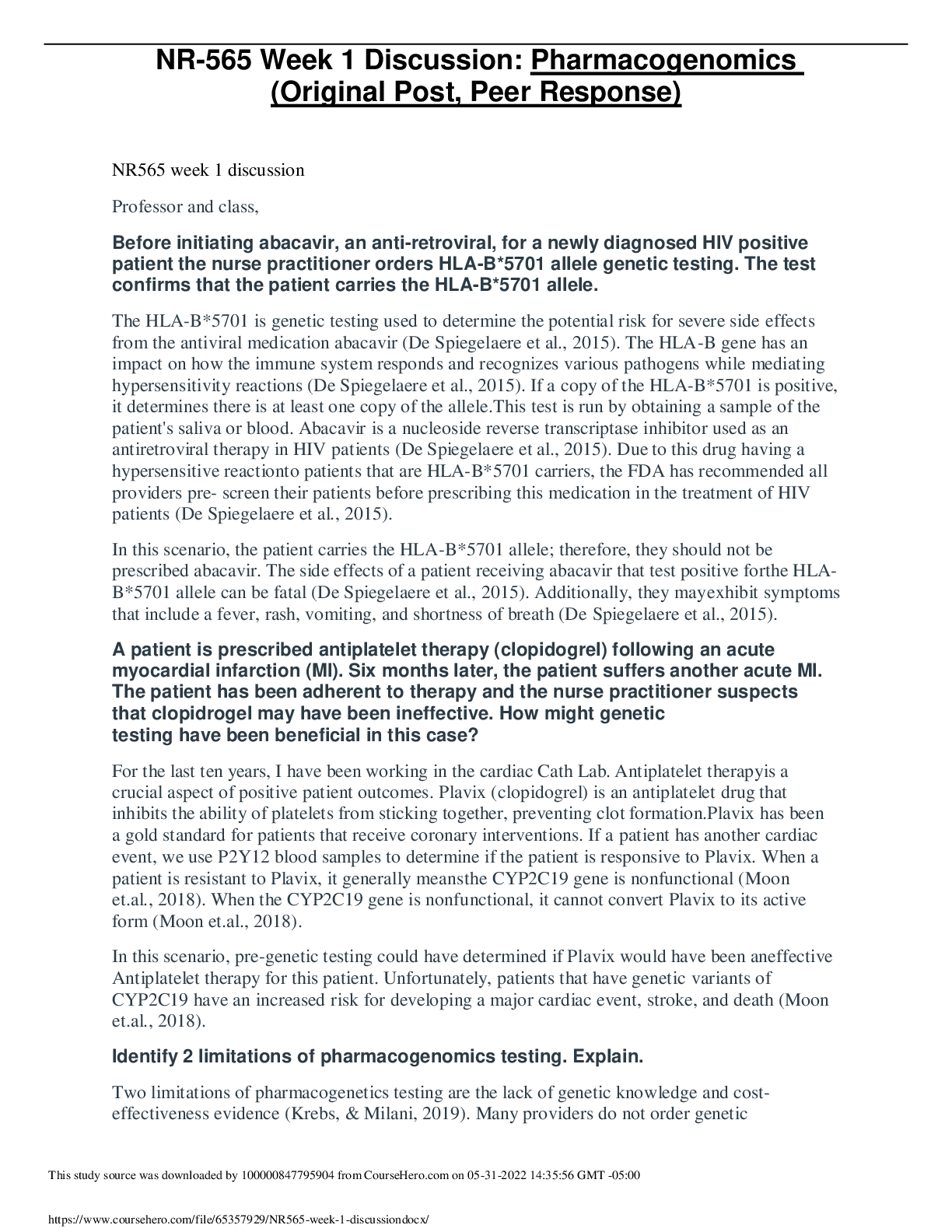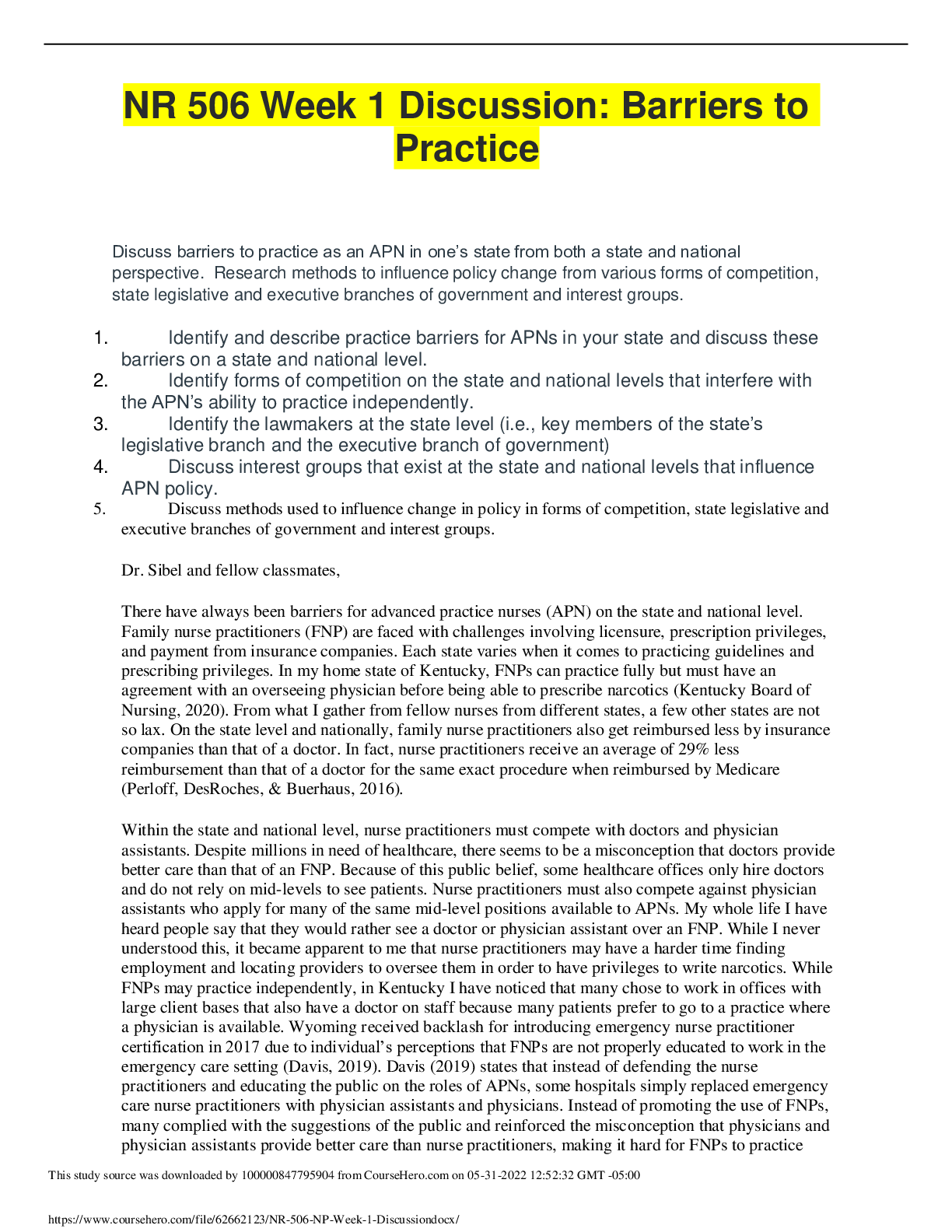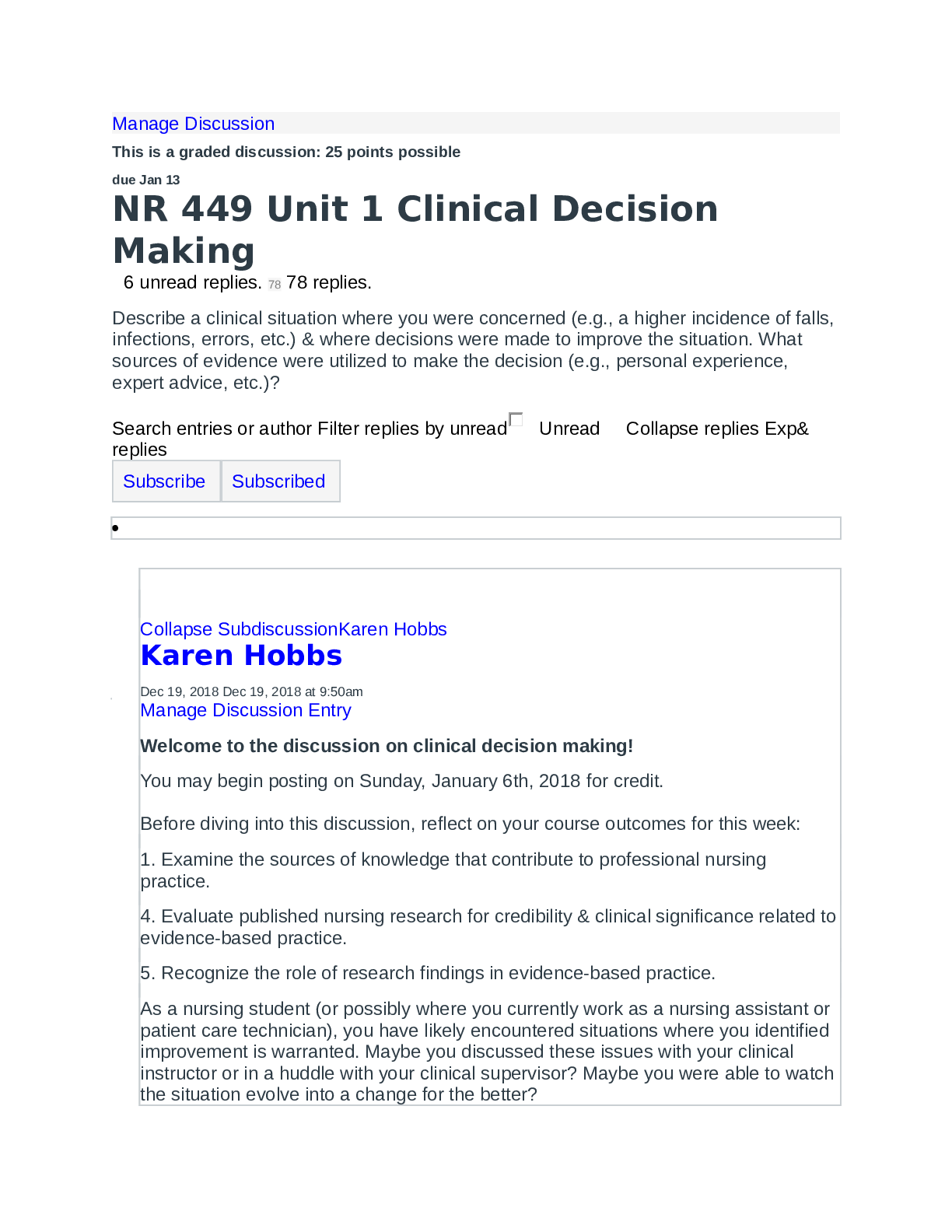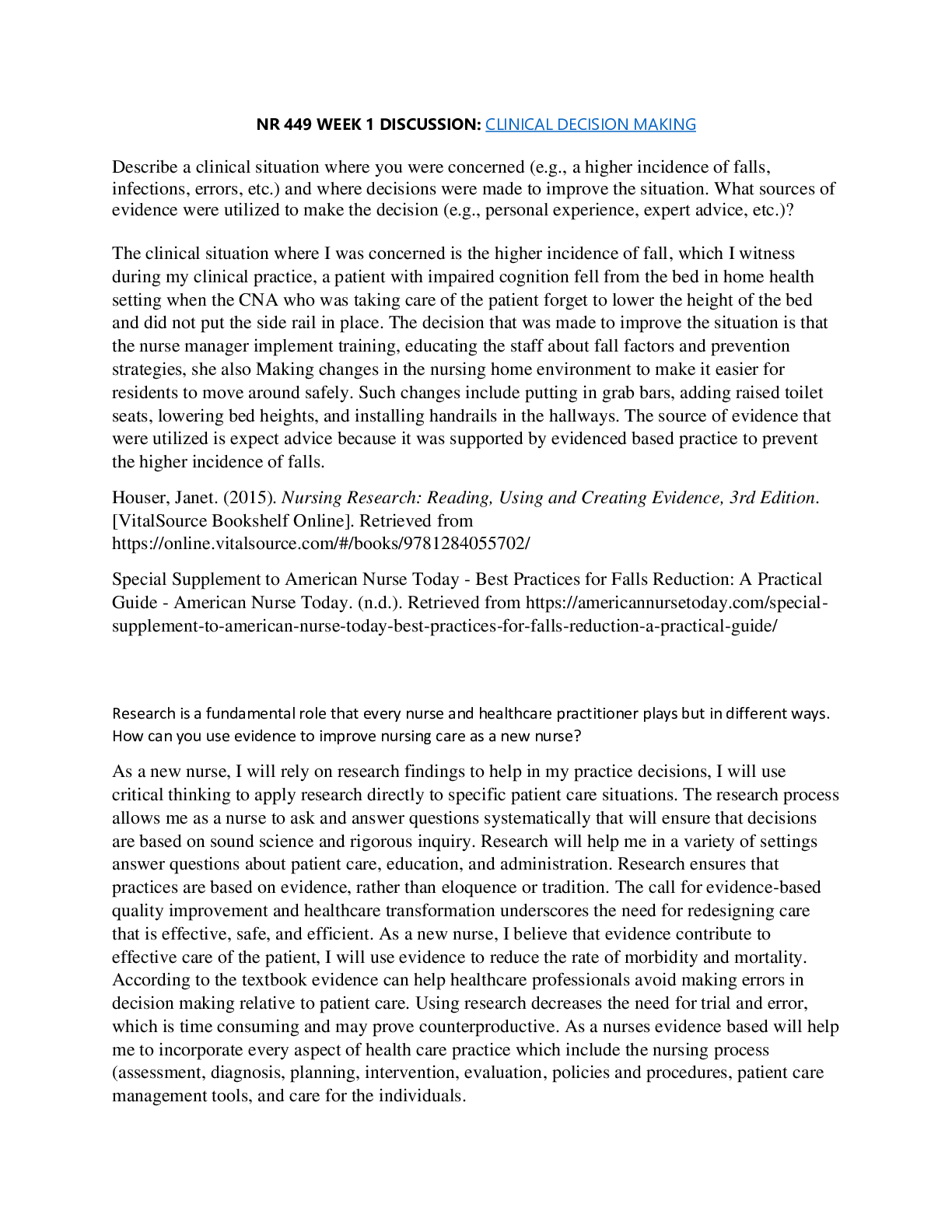*NURSING > DISCUSSION POST > NR 602 Week 1 Discussion: Introductions, Clinical Site Discussion (GRADED A+) (All)
NR 602 Week 1 Discussion: Introductions, Clinical Site Discussion (GRADED A+)
Document Content and Description Below
NR 602 Week 1 Discussion: Introductions, Clinical Site Discussion NR602 Week 1.1 Week 1: Introductions Dr. Plusnick and class, My name is Cathy. I live and work in the Northwest suburbs of... Chicago. I have lived here for 23 years, but I grew up in Colorado. I can’t wait to move back west. I have three adult children a son aged 30, a daughter aged 22, and a son aged 20. I also have two 3-year-old dogs, they’re brothers, who keep us entertained. My oldest son lives on the north side of the city. My daughter was just attends the University of Wisconsin-Madison and is home for the summer. And my youngest son is at home attending community college. As a single parent it is a challenge with three people in college at the same time, but we are all working together to make it happen. I have worked in the adult critical care setting for the last 14 years. It is a mixed unit, which I love, with a wide assortment of diagnoses to work with. I love the critical care setting, but it is physically brutal, and as I get older, I would rather not be crippled from my job. None of my extended family live in this state, and I have been stuck in this area due to a divorce for 23 years. But I have many wonderful and supportive friends and co-workers that support me mentally, spiritually, and emotionally; and I would not be on this journey without them. I would like to say I have hobbies. But with work and school, I have been limited for time during the last 4-5 years. I love to travel nationally and internationally. I love to read, fish, hike, garden, and spend time with family and dogs. Additionally, I enjoy drawing and painting, as well as crocheting. I am a part-time prepper, and work on developing survival skills, as well as increasing my knowledge to live a self-sustaining life-style when I return to Colorado in the future. It is a hobby. You have to do something with all the Walking Dead knowledge. I look forward to meeting all of you in the threads. Cathy Week 1: PBL Case Discussion: Initial Visit Meet the Family Part One Background and Visit One Background: Field Family: Mother: Kayla-age 37, Father: Mike-age 39, Daughter: Lily-age 15, Daughter: Jo-age 5, Son: Riley-age 13 months. Maternal Grandmother: Mary-age 55, Paternal Grandfather: Tom-age 62. Setting: Rural U.S. Office: Rural, NP owned, Family Practice Clinic PART 1: Today is a busy day in your rural family practice clinic. You are reviewing the chart of your next appointments and realize that there is very little information and that you are scheduled to do a well-woman and two well-child exams for the same family. Your office schedules 20 minutes for each well exam. Upon entering the room, you note a Latino-looking woman who appears in her 40s who sits focused on paperwork, a male infant sitting alone on the exam table, while a preschool-aged appearing female is sitting at your computer pretending to type on the keyboard. As you introduce yourself, the mother stands abruptly and grabs the toddler off of the exam table. She states, “I am so sorry. They usually behave. I am Kayla Field, and this is Riley and Jo.” You then inquire as to the reason for their visit. The mother reports they recently moved to the area to live with her parents due to a recent separation from her husband, Mike, but they are trying to resolve their issues and are in marital counseling. She is there to have a physical exams and to establish care, “In case we aren’t able to fix this and we all lose insurance coverage”. She reports that the children are currently healthy and routinely saw a pediatrician where they previously lived. She also has a teenage daughter that refused to come today because she wanted to ‘hang out with friends’. The mother reports she would really like to get her well exam done today as she has not had one since the birth of Riley. KAYLA HPI: Kayla reports that she is healthy and takes no medication. She has no symptoms that she can think of other than she is currently having trouble falling and staying asleep, but associates this with stress and with sleeping in the same room with her two younger children. She is a 15-year smoker of 1 PPD up until 18 months ago when she quit with the pregnancy of Riley. She is concerned about finances today and reports ongoing fatigue. She has not and menses since the birth of her last child. She is not currently sexually active with either men or women and has been abstinent for the last 6 months. PMH: Kayla denies any surgeries or past medical history other than four pregnancies, three births, one pre-term, and two cesarean sections with the last two births. She had one miscarriage at 10 weeks when she was 16. She also reports that she had PCOS as a teenager and has always had irregular menses. She had gestational diabetes with the last birth. She has no allergies. She is currently taking Advil PM every night to sleep and drinking a glass of wine. She does not routinely exercise. She often skips breakfast and lunch and eats whatever the children eat for dinner, which is often processed, or quick food. CHILDREN HPI: The mother denies any recent illnesses in either child and reports they are here for their check-up. She does report that since moving in with her parents recently, it has been difficult to get the children to go to bed at night and stay in bed and expresses extreme frustration with this. Jo has been getting up to play in the room at night and Riley is now waking at least once per night to take a bottle. She reports that they are eating three meals per day and two snacks, one at bedtime and one in the afternoon between lunch and dinner. Riley is still taking infant formula. Mother brushes their teeth twice a day, ride in car seats in the car, and play vigorously both indoors and outdoors at home. She also verbalizes extreme concern of their impending loss of health insurance. PMH Jo: Full-term gestation, born cesarean section, weight. 7 pounds 4 ounces. There were no complications in pregnancy, but the mother did smoke 1 pack-per-day throughout pregnancy. There were no hospitalizations—NKDA. The daily medication was chewable children’s multivitamin with iron. They eat three meals and two snacks. There is a great deal of juice, soda, and processed or quick foods given in the house. Riley: Born at 34 weeks gestation via cesarean section, weight. 5 pounds 1 ounce. The mother developed preeclampsia and gestational diabetes. The mother quit smoking when she found out she was pregnant. Riley has allergies per mother and sometimes takes Cetrizine syrup 2.5ml once daily, PRN congestion, and a children’s chewable multivitamin daily. Immunizations: Jo – Birth – Hep B, 2 months – DTaP, COMVAX, PCV13, IPV, 4 months - DTaP, COMVAX, PCV13, IPV, 6 months – DtaP, PCV 13, IPV. Hep B, 12 months – MMR, Varicella, Hep A, PCV 13, 18 months – DtaP, Hep A Riley - Birth – Hep B, 2 months – DTaP, COMVAX, PCV13, IPV, 4 months - DTaP, COMVAX, PCV13, IPV, 6 months – DtaP, PCV 13, IPV, Hep B Social History: Both children currently live with their mother and maternal grandparents for the last 8 weeks. Their father is involved but lives several hours away where he works. Jo will be starting kindergarten this fall in the community’s elementary school. Family History: They are maternal and paternal smokers. The mother has been one since age 22 at one pack-per-day until 18 months ago. The father continues to smoke. There were no diseases reported in either parent. Kayla has a history with gestational diabetes. Mary has a history of hyperlipidemia, Type 2 DM, and Hypertension. They are Latin American in descent, emigrated from Cuba in the 1970s. Tom has a history of hypertension, hyperlipidemia, and an MI with stenting 2 years ago. The mother has two siblings; one who died in an MVA 5 years ago at the age of 18 a younger brother, and an older sister who is 42 and lives in a large urban city in the Midwest with her family, and she is in good health but also had PCOS and difficulty conceiving. Other family members died of old age. She is unaware of paternal familial health history. Discussion Questions Part One: • Please prepare yourself to complete the well-woman exam and one of the well- child exams of your choosing. • Per patient- give additional HPI information and questions you would like as well as PMH, Family History, and ROS. Begin to lay out the objective portion of your note for each patient. • What is your differential diagnosis list for this visit thus far with rational for each of your two patients? • For the child you choose, please list all of the appropriate anticipatory guidance that should be done at a well visit for that age. Expand on one of the topics from your list and provide the education you would offer with citations. Dr. Plusnick and class, Patient Information: KF, 37, Female, Hispanic S. CC: Well woman exam, trouble falling and staying asleep. HPI: O: Eight weeks ago. L: Generalized. D: Unknown. C: Frustration, worries, fatigue, increased stress levels. A: Separation from husband, and moving into her parent’s home with her children eight weeks ago, and sharing a room with her two younger children. R: Not reported. T: Advil PM and a glass of wine each evening. Coming to clinic to establish care in the area for family. Lily, 15 year-old daughter not in attendance. Would like a well-woman exam today, since she hasn’t had one since her youngest child was born. Question: What is should looking for most in today’s exam? Current Meds: Advil PM. Questions: What dosage of Advil PM are you using? Do you take any vitamins or herbal supplements? Do you use any contraception? Allergies: NKDA. Questions: Does she have any food or environmental allergies? PMHx: No past medical history. Surgeries include 2 C-sections for her youngest children 5 years and 13 months ago. PCOS by history. Gestational diabetes and preeclampsia with last pregnancy. Questions: Are her immunizations up to date? When was her last tetanus vaccine? Has she any childhood illnesses? Has she ever been hospitalized? Social History: Married to husband, Mike, but separated at this time. Currently in marital counseling to resolve issues. Lives with her parents Mary-age 55, and Tom-age 62; along with her children-Lily-age 15, Jo-age 5, and Riley-age 13 months. Sharing a room with her two youngest children. Both Kayla and her husband, Mike are smokers. Multiple social concerns related to separation including: finances, insurance, living conditions, stress, insomnia, and marital issues. Drinks one glass of wine each evening. 15 year smoker 1-ppd; quit 18 months ago. Unknown recreational drug use. Unknown caffeine intake. No routine exercise. Diet-skips breakfast and lunch. Eats dinner with children. Dinner is often processed or quick foods. There is a great deal of juice and soda in the house. Questions: How long has she been married? Does she use a seatbelt for herself? Are there working smoke detectors in the home? Does she work outside of the home? If yes, what type of work? Does she have any hobbies? Does she drink caffeinated beverages, how many? Has she used recreational drugs now or in the past? Is she receiving financial support from her husband? How often does her husband take the children for visitation? Family History Mother, Mary, 55-years old-history of hyperlipidemia, Type 2 DM, and HTN. Father, Tom, 62- years old-history of HTN, Hyperlipidemia, and MI with stenting two years ago. They both emigrated from Cuba in the 1970s. Younger brother that died five years ago in MVA at age 18. Older sister, aged 42, who lives in the Midwest with her family, with a history of PCOS and fertility issues; otherwise in good health. All other deceased family members died of old age. ROS: CONSTITUTIONAL: Healthy and takes to prescribed medications. Currently having trouble falling and staying asleep secondary to stress, and sharing a room with her two younger children who wake up at night. Fatigued. Questions: Has she had any fevers or chills, change in appetite, weight loss or gain? CARDIOVASCULAR: Not reported. Questions: Has she had any chest pain, pressure, or palpitations? BREASTS: Not reported. Questions: Has she had any discharge, dimpling, discoloration, or bleeding from her breasts? Did she ever breast feed any of her children? Has she had any breast surgery? Has she every had a mammogram? If yes, why? Does she do a monthly breast self-exam? Does she know how to do one? RESPIRATORY: Not reported. Questions: Has she had any shortness of breath, wheezing, or cough? GASTROINTESTINAL: Not reported. Questions: Has she had any abdominal pain? Has she had any nausea, vomiting, indigestion, constipation, or diarrhea? Has she had any bleeding? GENITOURINARY: Not reported. Questions: Has she had any incontinence, burning with urination, increased frequency, a feeling of not fully emptying her bladder? Has she had any pelvic or flank pain? Has her urine color changed, or does it have a strong odor? GYNECOLOGICAL: Gynecologic History: Gravida 4, Term 2, Pre-term 1, Abortions 1, Living Children 3. LMP was approximately 22 months ago. PCOS by history. Irregular menses since onset. First pregnancy at age 16-miscarried at 10 weeks. 2nd pregnancy-15 years ago, full term female by vaginal delivery. 3rd pregnancy-5 years ago, full term female, 7 pounds 4 ounces by C- section. 4th pregnancy 13 months ago, 34 weeks gestation, 5 pounds 1 ounce, pre-term male by C-section. Not currently sexually active with men or women. Has been abstinent for the last six months. Questions: At what age did she begin menarche? When she does have a menstrual cycle, how long does it last; and how heavy is the flow? Did she have any complications with any of her pregnancies or deliveries? Why did she have to have C-sections? Why did her last child deliver pre-term via C-section? She stated that she stopped smoking when she found out she was pregnant, 18 months ago. To clarify, was she four months pregnant when she realized she was pregnant? Was the first pregnancy a spontaneous miscarriage? Did she have to have any procedures or hospitalization with the miscarriage? Does she have a history of vaginal or pelvic infections? If so, how and when was it treated, and did it respond to treatment? Was there any complications? Has she ever had a sexually transmitted infection? If so, when and how was it treated? Were there any complications? Does she douche, and if so why? Has she had any history of urinary tract infections or bladder issues? When was her last Pap smear? Did she have one during her pregnancy? Has she ever had an abnormal Pap smear? What is her sexual orientation? How many sexual partners has she had in the last year? How many lifetime sexual partners has she had? Has she ever used contraception now or in the past? If yes, what type, did she have side effects, was she satisfied with the contraceptive method, was it easy to use? Has she had any vaginal itching or dryness? Has she had any hot flashes or night sweats? LYMPHATIC: Not reported. Questions: Has she noticed any enlarged lymph nodes or nodules? ENDOCRINOLOGIC: Not reported. Questions: Has she noticed an increase in thirst or hunger? Has she had an increase in urinary frequency? Has she noticed an intolerance of cold or heat, or hot flashes? Has she noticed any changes to her skin or hair? Has she noticed an increase or decrease in hair growth on her body? Has she noticed any cognitive problems? PSYCHOLOGIC: Sleep disturbances, stressed, frustrated, multiple worries. Questions: Has she noticed any headaches, feeling anxious, feeling hopeless, feeling depressed? Has she had negative thoughts? Has she had feelings that scare her? Has she thought of harming herself or others? Has she noticed any moodiness, nervousness, irritability? Was there any physical or emotional abuse in your marriage? Has she noticed that she doesn’t seem to find enjoyment in life? O. Physical exam: Vital signs: BP, HR, RR, T. Height, Weight, BMI CONSTITUTIONAL: Appearance older than stated age. Upon entering room, patient is absorbed in paperwork while toddler is sitting unattended on the exam table, and daughter is tapping on computer. Swiftly rises apologetically for children’s behavior. Continue to observe for emotional state, appropriateness of dress, speech pattern, and social interaction in visit. HEART: Auscultate heart sounds, rate, and rhythm. LUNGS: Auscultate lung sounds for clarity, symmetry, and adventitious sounds. ABDOMEN: Auscultate abdomen for bowel and vascular sounds, percuss all for quadrants, palpate for organomegaly and tenderness. BREASTS: Complete and teach, if necessary, bilateral breast exam including axilla for lymph nodes. Observe for breast atrophy. GENITOURINARY: Plan to complete thorough exterior and interior pelvic exam, obtain cervical brushings for cytology. If concerned through ROS questioning, obtain cultures for gonorrhea, syphilis, and chlamydia. Bimanual exam to determine positioning of uterus, cervical and adnexal tenderness, and enlarged organs or masses. Observe for clitoromegaly. ENDOCRINOLOGIC: Observe for dryness of skin or hair, excess or loss of hair. Observe for acne over face, chest, back, and neck. Observe for acanthosis nigricans. PSYCHOLOGIC: Observe for any signs of previous or current injuries. Diagnostic Tests: None provided. A. Differential Diagnoses Polycystic Ovarian Syndrome (PCOS) (ICD-10 code E28.2) is the frequent anovulation which leads to amenorrhea, oligomenorrhea, and hyperandrogenism (Reilly, 2013). It is the most frequently diagnosed endocrine disorder of women of reproductive age (Goodman, et al., 2015; Meeks, Bravis, Don, & Kaplan, 2013). It is associated with obesity, insulin resistance, metabolic syndrome, Type II Diabetes, hypertension, hyperlipidemia (Goodman, et al., 2015; Meeks, Bravis, Don, & Kaplan, 2013). Pertinent positives: previous diagnosis, sister with PCOS, history of gestational diabetes, amenorrhea for 22 months. Pertinent negatives: No medical records with positive history present, no infertility issues reported, no hyperandrogenism reported. Because KF reports a personal history and family history of PCOS, combined with her symptomology I believe this to be most likely the primary problem for her. Type II Diabetes Mellitus, unspecified (ICD-10 code E11.9) is a syndrome of hyperglycemia of multiple causes (ADA, 2016; Ferri, 2016). Risk factors include: sedentary lifestyle, BMI >25, first degree relative with diabetes, ethnicity (African-American, Native-American, Hispanic, Asian American, and Pacific Islander), large birth weight baby delivered, history of gestational diabetes, hypertension, polycystic ovarian syndrome, hyperlipidemia, history of cardiovascular disease, obesity, or other conditions associated with insulin resistance (ADA, 2016; Ferri, 2016). Pertinent positives: first degree relative with diabetes, Hispanic ethnicity, history of gestational diabetes, and PCOS. Pertinent negatives: large birth weight baby delivered, hypertension, hyperlipidemia, obesity, and history of cardiovascular disease. KF has enough previous history and symptoms to necessitate ruling out Type II Diabetes Mellitus. High Risk Pregnancy Due to Social Problems, Unknown Trimester (ICD-10 code O09.70) pregnancy with high risk due to social or medical issues (Reilly, 2013). Pertinent positives: late presentation of previous pregnancy (four months), daily use of wine, previous history of miscarriage, lack of prenatal care, history of gestational diabetes, and history of two c-sections. Pertinent negatives: no positive pregnancy test, last time sexually active six months ago. Since KF presented to the physician initially with her last pregnancy already in the second trimester, it is a concern that she could once again be pregnant at this time, and a pregnancy test should rule this out. Symptomatic Premature Menopause (ICD-10 code E28.310) is the absence of menstruation for over one year and usually happens after age 40, if before age 40 it is considered premature; smoking increases risk of premature menopause (Ferri, 2016). Symptoms include: atrophic vaginitis; complete cessation of menses or irregular cycles; urinary incontinence; psychologic dysfunction-irritability, inability to concentrate, insomnia, depression, anxiety, nervousness; decreased libido; and vasomotor symptoms- hot flashes, night sweats, headaches, tiredness, lethargy, increased coronary artery and cardiovascular disease (Ferri, 2016). Pertinent positives: absences of menstruation for 22 months, 15 year 1 ppd smoking history, irritability, insomnia, anxiety, nervousness, depression, and tiredness. Pertinent negatives: atrophic vaginitis, concentration loss, decreased libido, hot flashes, night sweats, headaches, urinary incontinence, coronary or cardiovascular problems. KF has symptoms which could lead us to believe she has entered premature menopause, especially with an absence of menstruation since the birth of her youngest child, history of smoking , and symptomology. To rule out this diagnosis, serum FSH should be drawn 4-6 weeks apart; if both are elevated ovarian insufficiency causing premature menopause would be an appropriate diagnosis (NICE, 2016). Hyperthyroidism, unspecified (ICD-10 code P72.1) is the production of excess thyroid hormone causing hypermetabolic state (Ferri, 2016). Symptoms of hyperthyroidism include: menstrual dysfunction, irritability, anxiety, tachycardia, tremor, heat intolerance, increased appetite, weight loss, or diarrhea (Ferri, 2016). Pertinent positives: menstrual dysfunction, irritability, and anxiety. Pertinent negatives: no report of tachycardia, tremor, heat intolerance, increased appetite, weight loss, or diarrhea. Anemia, Iron Deficiency (ICD-10 code D50.9) is microcytic, hypochromic anemia caused by the disproportion of iron intake exceeded by iron losses (Hollier, 2016). Associated with bleeding (menses, GI, post-operative, or hematuria), decreased iron intake, increased iron requirements, lactation, pregnancy, or poor iron absorption (Hollier, 2016). Symptoms include: fatigue, tachycardia, cold intolerance, tinnitus, dyspnea with exertion, headache, palpitations, concentration difficulties, pallor, restless leg syndrome, frequent infections, and pica (Hollier, 2016). Pertinent positives: poor nutrition intake and fatigue. Pertinent negatives: no report of bleeding, lactation, pregnancy, tachycardia, tinnitus, dyspnea with exertion, headache, palpitations, concentration difficulties, pallor, restless leg syndrome, pica, or frequent infections. Hypothyroidism, unspecified (ICD-10 code E03) is the inadequate secretion of thyroid hormone causing a hypometabolic state (Ferri, 2016). Symptoms include: fatigue, weakness, lethargy, cold intolerance, muscle weakness, weight gain, poor memory, slow speech and thoughts (Ferri, 2016). Pertinent positives: fatigue. Pertinent negatives: no report of weakness, lethargy, cold intolerance, muscle weakness, weight gain, memory or cognitive change. Depression, unspecified (ICD-10 code F32.9) episodic often recurrent mood disorder requiring five of criteria being present for at least two weeks (Ferri, 2016). The criteria include: depressed mood, anhedonia, sleep disturbances, appetite problems, fatigue, psychomotor changes, difficulty concentrating, guilt, worthlessness, indecisiveness, and suicidal ideation (Ferri, 2016). Often triggered by life events that are stressful (Ferri, 2016). Pertinent positives: for last eight weeks has had sleep disturbances and fatigue triggered by separation from husband, sharing bedroom with 13 month old and five year old, and moving in with her parents combined with financial and health insurance concerns. Pertinent negatives: no reported depressed mood, anhedonia, appetite problems, psychomotor changes, concentration difficulties, guilt, indecisiveness, worthlessness, or suicidal ideation. Anxiety, unspecified (ICD-10 code F41.8); general anxiety disorder often occurs with other mental health issues (Ferri, 2016). Usually presents with anxiety, fear, or worry out of proportion of circumstances causing interference in functioning (Ferri, 2016). Symptoms include: reports of being anxious most of their lives, excessive worry over family, finances, health, or work; sleep disturbance including early insomnia, difficulty concentrating, daytime fatigue, muscle tension, irritable bowel syndrome, comorbidity of depression, dysthymia, or substance abuse (Ferri, 2016). Pertinent positives: excessive worry over family, finances, and health; sleep disturbances including early insomnia, daytime fatigue, and daily wine consumption. Pertinent negatives: reports of anxiety most of her life, difficulty concentrating, muscle tension, irritable bowel syndrome, diagnosis of depression or dysthymia. Sleep deprivation (ICD-10 code Z72.820) is the lack of adequate sleep due to insomnia, the inability to fall asleep or stay asleep that occurs due life events, illness, sleep disorder, chronic illness, or pathophysiologic causes (Chittora, et al., 2015). It can lead to depression, anxiety, impatience, irritability, headaches, confusion, hand tremors, obesity, increased blood pressure, increased risk of diabetes, memory lapse or loss, dizziness, puffy or dark circles under the eyes, aching muscles, and many other symptoms (Chittora, et al., 2015). Pertinent positives for KF: insomnia due to inability to fall asleep and stay asleep; stressful life events; anxiety, and reported frustrations. Pertinent negatives: no mention of cognitive changes, hand tremor, headache, blood pressure changes, change of eye appearance, or muscle aches. References American Diabetes Association (ADA). (2016). Recommendations for diagnosis and classification of diabetes-2016. Retrieved from http://care.diabetesjournals.org/content/suppl/2015/12/21/39.Supplement_1.DC2/2016- Standards-of-Care.pdfAmerican Diabetes Association. (2016). Professional practice committee for the standards of medical care in diabetes. Diabetes Care, 39 (supplement 1). Chittora, R., Jain, A., Suhalka, P., Sharma, C., Jaiswal, N., & Bhatnagar, M. (2015). Sleep deprivation: Neural regulation and consequences. Sleep and Biological Rhythms, 13(3): 210-218. Ferri, F. (2016). Ferri’s clinical advisor, 5 books in 1. Providence, Rhode Island: Elsevier, Inc. Goodman, N., Cobin, R., Futterweit, W., Glueck, J., Legro, R., & Carmina, E. (2015). American Association of Clinical Endocrinologists, American College of Endocrinology, and Androgen Excess and PCOS Society Disease State clinical review: Guide to the best practices in the evaluation and treatment of polycystic ovary syndrome-part 2. Endocrine Practice, 21(12): 1415-1426. DOI: 10.1458/EP15748.DSCPT2 Institute for Clinical Systems Improvement (ICSI). (2016). Health care guideline: Depression in primary care. Retrieved from https://roar.nevadaprc.org/system/documents/4068/original/NPRC.3054.Depr- Interactive0512b.pdf?1471560355 LeFevre, M. (2015). Screening for thyroid dysfunction: U.S. Preventive Services Task Force recommendation statement screening for thyroid dysfunction. Retrieved from http://annals.org/article.aspx?articleid+2208599 Meek, C., Bravis, V., Don, A., & Kaplan, F. ( 2013). Polycystic ovary syndrome and the differential diagnosis of hyperandrogenism. The Obstetrician & Gynaecologist, 15: 171- 176. DOI: 10.111/tog.12030 National Institute of Health and Care Excellence (NICE). (2015). Menopause: diagnosis and management. Retrieved from https://www.nice.org.uk/guidance/ng23/resources/menopause-diagnosis-and- management-1837330217413 Reilly, T. (2013). Women’s gynecologic health, 2nd ed. Burlington, MA: Jones & Bartlett Learning. Patient Information: RF, 13 months, male, Hispanic S. CC (chief complaint) waking up multiple times a night for a bottle. HPI: O: Eight weeks ago. L: Bedroom. D: Minimally once every night. C: None reported. A: Wakes up, as does sister who plays. R: Bottle. T: None. Questions for mother: Does he wake up asking for a bottle, or do you give him a bottle to try to get him back to sleep? Does he seem hungry at night? Do you feel that he or his sister wakes up first? Does he cry when he wakes up? Prior to moving in with the grandparents, was he sleeping through the night? Does Riley still take a nap(s)? Current Meds: Cetrizine syrup 2.5 ml once daily PRN congestion, children’s chewable vitamin. Questions for mother: Who told you to give the cetirizine syrup to Riley? How often are you giving it to him? Do you crush the chewable vitamin, or is he able to chew it up himself? Immunizations: Birth-Hep B; 2 months-DTaP, COMVAX, PCV13, IPV; 4 months-DTaP, COMVAX, PCV13, IPV; 6 months-DTaP, PCV13, IPV, Hep B. Questions for mother: I see that Riley has not received his 12 month vaccinations. If that is correct, can we resume his vaccinations today? Allergies: mother reports child has allergies. Questions for mother: What type of allergies does Riley have? What are the symptoms of his allergies? PMHx: Birth History: Born at 34 weeks gestation via cesarean section, weighing 5 pounds, 1 ounce. He was the fourth pregnancy for his mother, third live birth. Mother had gestational diabetes and preeclampsia during pregnancy. Mother smoked until she was approximately four months pregnant. Questions for mother: Did Riley have any complications after his birth? Did Riley stay in the hospital longer than you did? Has he had any surgeries, other hospitalizations, or major illnesses? Did you drink alcohol while you didn’t know you were pregnant? Did he have any exposure to medications, toxins, or infections in utero? Did he gain weight normally this past year? Does Riley have any special health care needs? Social History: Lives with mother, Kayla and has visitation with father, Mike, who are separated at this time. Also living in the home are grandparents Mary-age 55, and Tom-age 62; along with sister-Lily- age 15, and sister, Jo-age 5. Sharing a room with mother and sister, Jo. Eats breakfast and lunch. Mother eats dinner with children. Dinner is often processed or quick foods. There is a great deal of juice and soda in the house. Also consumes two snacks daily; one in the afternoon and one before bedtime. Still taking formula. Mother brushes his teeth twice a day. Rides in car seat in the car. Robust indoor and outdoor play reported by mother. Mother drinks one glass of wine every evening, both mother and father with a history of tobacco use. Mother quit smoking when she found out she was pregnant with Riley, approximately 4 months gestational age. No recreational drug use reported in the home. Mother vocalizes concerns finances, possibly losing insurance, frustration with children’s sleep pattern, and separation from spouse. Questions for mother: How has Riley been eating at each meal? What type of formula are you using? Can you describe the food Riley eats every day? Does he drink juice and soda? Who purchases the food in the home? Who prepares meals for the children? Do you have time for yourself? Are you and/or the children active in community activities, a church, or school activities? Who watches Riley if you are not home? Does your parent’s home have a pool or firearms? Has either of your other children ever had lead poisoning, or one of their playmates? Was the home you shared with your husband, or your parent’s home built before 1978, or has it been recently renovated or remodeled? Does Riley go to daycare or any facility or home built before 1950? Have you traveled for more than one week out of the country? Was Riley born in the United States? Has anyone in the family or personal contact either had tuberculosis or a positive skin test? Is the home’s water fluorinated? Have you seen a dentist in the area? Family History: Mother, aged 37, history of PCOS, gestational diabetes, and preeclampsia. Grandmother, Mary, 55-years old-history of hyperlipidemia, Type 2 DM, and HTN. Grandfather, Tom, 62-years old- history of HTN, Hyperlipidemia, and MI with stenting two years ago. They both emigrated from Cuba in the 1970s. Uncle that died five years ago in MVA at age 18. Aunt, aged 42, who lives in the Midwest with her family, with a history of PCOS and fertility issues; otherwise in good health. All other deceased family members died of old age. No family history from paternal side available. ROS: CONSTITUTIONAL: Sitting unattended on exam table, mother is looking at paperwork, and sister is playing at the computer. Mother reports he is healthy, and has routinely seen a pediatrician. No recent illness or sick contacts. Difficult to get him to bed in the evening, waking up minimally once at night for a bottle. Questions for mother: Has he had any fevers? Has he been gaining weight? How has his appetite been? Do you have nap routines? Do you have bedtime routines? HEAD: None reported. Questions for mother: Has he had any traumas or accidents that may have caused an injury to his head? Have you noticed any changes in his head shape? EENT: None reported. Questions for mother: Has he been pulling at his ears? Have you noticed any discharge or redness of his ears? Has he had any changes in his hearing that concerns you? Has he had any redness, dryness, or drainage from his eyes? Do you feel he has any vision problems? Does he hold objects close like he is trying to focus? Do his eyes cross, drift, or seem lazy? Does he have one or both eyelids that droop? Has Riley ever had an injury to his eyes? Has he had a runny nose, sneezing, or purulent drainage from his nose? Has he been drooling and chewing on things? Have you noted any teeth coming in? Has he had any speaking problems that concern you? SKIN: None reported. Questions for mother: Have you noticed any rashes, lesions, or bruising? Has he had any diaper rashes? CARDIOVASCULAR: None reported. Questions for mother: Have you noticed a blue tinge to Riley’s extremities or lips? Did he have any cardiac complications with his premature birth? RESPIRATORY: None reported. Questions for mother: Has Riley been coughing, wheezing, labored breathing, or retractions? Has he been coughing anything up? GASTROINTESTINAL: None reported. Questions for mother: Does Riley eat solid foods? How would you describe his stools? How many does he have a day? Does he refuse foods? Has he had any history of colic? Has he had any abdominal pain, vomiting, diarrhea, or constipation? GENITOURINARY: None reported. Questions for mother: Has Riley been circumcised? Has he had any urinary problems or foul smelling urine? NEUROLOGICAL: None reported. Questions for mother: Did he ever have any seizures? Have you noticed any tremors? MUSCULOSKELETAL: None reported. Questions for mother: Has he had any fractures or injuries? LYMPHATIC: None reported. Questions for mother: Have you noticed any swollen lymph nodes? ENDOCRINOLOGIC: None reported. Questions for mother: Does he seem always thirsty or hungry? Does he seem to urinate more than usual? Have you noticed any sweating? TEMPERMENT: None reported. Questions for mother: How would describe Riley’s temperament? Does he have temper tantrums? Do you have any concerns about Riley’s behavior? How do you manage Riley’s behavior? DEVELOPMENTAL: Taking bottles of formula. Questions for mother: Does Riley walk independently? Does he say “mama” and “dada”? Does he have one more word he can say meaningfully? Does he point to desired objects? Can he bang toys together, wave bye-bye, mimic you, look at the things you are looking at, cry when you leave, plays peekaboo, babble or try to make the same sounds you do, and follow simple commands? Can Riley use a spoon and drink from a cup? Does Riley suck his fingers or thumbs, or use a pacifier? Do you have any concerns about Riley’s learning or development? O. Physical exam: Vital signs: BP, T, HR, RR. Height, Weight, Head Circumference. BMI. Including percentage on CDC growth charts, include changes in height, weight, head circumference, and BMI. CONSTITUTIONAL: Assess general appearance. HEENT: Assess head for symmetry and fontanelle. Assess ears for ability to hear. Observe for red reflex, perform cover/uncover test. Assess nose for abnormalities, drainage, erythema. Assess teeth for caries, white spots, staining. Assess mouth and throat. PULMONARY: Assess lung sounds, rate. CARDIOVASCULAR: Assess for heart sounds, murmurs, and cyanosis. GASTROINTESTINAL: Observe, auscultate, percuss, and palpate. GENITOURINARY: Assess testes down. MUSCULOSKELETAL: Assess extremities and hips. Assess spine. NEUROLOGICAL: Test for tone, strength, and gait. SKIN: Assess skin for rashes, lesions, bruising, and scars. DEVELOPMENTAL: Can he demonstrate a pincher grasp? Can he release a cube in a cup? Does he give you his toys if you request it? Can he stack two cubes? Diagnostic Tests: None provided. A. Differential Diagnoses Encounter for Routine Child Health Evaluation with Abnormal Findings (ICD-10 code Z00.121) Pertinent positives: Waking up minimally once a night for the last eight weeks and needs a bottle to get back to sleep; mother reports he has allergies for which she gives him Cetrizine syrup 2.5 ml once daily as needed for congestion-this medication is not approved for children his age; he is one month behind on his immunization schedule; history of premature birth and mother with gestational diabetes and preeclampsia during his pregnancy; mother smoked until he was four months gestation and lived with father who is a current smoker until eight weeks ago; mother and father are recently separated and mother is under considerable stress; Pertinent Negatives: Mother reports he is healthy, and has routinely seen a pediatrician. No recent illness or sick contacts. Mother brushes his teeth twice daily. Rides in car seat in the car. Robust indoor and outdoor play reported by mother. Riley is eating three meals, and two snacks daily, and takes a daily multivitamin. History of Prematurity and Low Birth Weight (ICD-10 code Z87.898) Pertinent positives: By history, born at 34 weeks at 5 pounds, 1 ounce. Pertinent Negatives: Mother has not reported any complications after birth, or any concerns surrounding his birth. She also does not report any illnesses or delays related to prematurity. Behavioral Insomnia, unspecified (ICD-10 code Z73.819) Pertinent positives: Riley has been waking up at least once a night. Pertinent Negatives: Recent onset with parent’s separation and move to grandparent’s house. Family Disruption Due to Other Extended Absence of Family Member (ICD-10 code Z63.32) Pertinent positives: Parents are separated and father lives an hour away. Pertinent Negatives: Father is still active in Riley’s life. Disruption of Family Due to Stressful Life Events (ICD-10 code Z63.8) Pertinent positives: mother and father are recently separated and mother is under considerable stress; moved in with grandparents eight weeks ago; now sharing bedroom with sister and mother. Pertinent Negatives: Riley remains living around family members. Child Neglect, Suspected (ICD-10 code T76.02) secondary to nutritional deficiency, parental inattention, parental frustration and stress, one month late for 12 month check-up and vaccines. Pertinent positives: Meals consist of processed or quick foods. There is a lot of juice and soda in the household. Sitting unattended on exam table when practitioner enters the room, mother is looking at paperwork, and sister is playing at the computer. Pertinent Negatives: Riley is eating three meals, and two snacks daily, and takes a daily multivitamin. Encounter for Immunization (ICD-10 code Z23) Pertinent positives: One month behind on vaccinations. Pertinent Negatives: Mother has many stressors and is bringing child in now to re- establish his healthcare. • For the child you choose, please list all of the appropriate anticipatory guidance that should be done at a well visit for that age. Expand on one of the topics from your list and provide the education you would offer with citations. Anticipatory guidance for Riley’s mother will include: • Provide mother with Bright Futures Parent Handout-12 month visit (AAP, 2017) • Discuss family support including: time for herself, age appropriate activities, and community activities (AAP, 2017). • Establishing routines (especially in a new environment) including: nap and bedtimes, meals, and family traditions (AAP, 2017). • Nutrition: Encourage self-feeding, meals and snack times should be consistent, offer a variety of nutritious foods to eat, and include iron fortified formula (AAP, 2017). • Establishment of a dental home, with a first dental visit, continue brushing teeth twice a day, give only water in the bottle, and no bottles in bed (AAP, 2017). • Safety issues including: continue the use of car seats, no supervision by young children, child-proofing her parent’s home, keep poisons and toxins locked away, keep sharp objects out of reach, fall prevention with gates at stairs, and any firearms should be locked up (AAP, 2017). The definition of child neglect and abuse varies by state. The statutes and policies are developed using federal guidelines. I looked up the Illinois definition for neglect since I live there. According to Child Welfare Information Gateway (2016), Illinois defines child neglect as a child who is not receiving the necessary nourishment (adequate food), clothing, shelter, medical care, support, or remedial treatment as determined by a physician. The child could also be exposed to an injurious environment that places the child’s physical well-being, health and welfare at risk; and the harm is likely caused by the blatant disregard of the responsibilities the parent or care giver has in caring for the child (CWIG, 2016). Newborns or infants whose body fluids or excrement contain controlled substances are also considered neglected (CWIG, 2016). It would appear that up until this marital separation compounded with stressors associated with finances, living conditions, and insurance stability, Riley’s mother was working at making healthy choices for Riley. The stressors in her life may be causing distractions from every day care giving for Riley. The stressors could be reflected in Riley’s changes in sleep pattern, which adds additional frustration to Kayla. Because Illinois law discusses multiple types of neglect, and the blatant act of neglect, I would want to really question her more about the situation at home, and ways to alleviate her stress to help her be a more effective parent before labeling her as neglectful. However, if further interviewing, and physical exam point to more obvious signs of neglect, as a mandatory reporter, I would have to notify the Department of Child and Family Services for follow-up. References American Academy of Pediatrics (AAP). (2017). Bright futures core tools 12 month visit. Retrieved from https://brightfutures.aap.org/Bright%20Futures %20Documents/CoreTools12MonthVisit.pdf Child Welfare Information Gateway (CWIG). (2016). State statutes search Illinois: Definitions of child abuse and neglect. Retrieved from https://www.childwelfare.gov/topics/systemwide/laws-policies/state? CWIGFunctionsaction=statestatutes:main.getResults [Show More]
Last updated: 1 year ago
Preview 1 out of 19 pages

Reviews( 0 )
Document information
Connected school, study & course
About the document
Uploaded On
Sep 06, 2021
Number of pages
19
Written in
Additional information
This document has been written for:
Uploaded
Sep 06, 2021
Downloads
0
Views
61
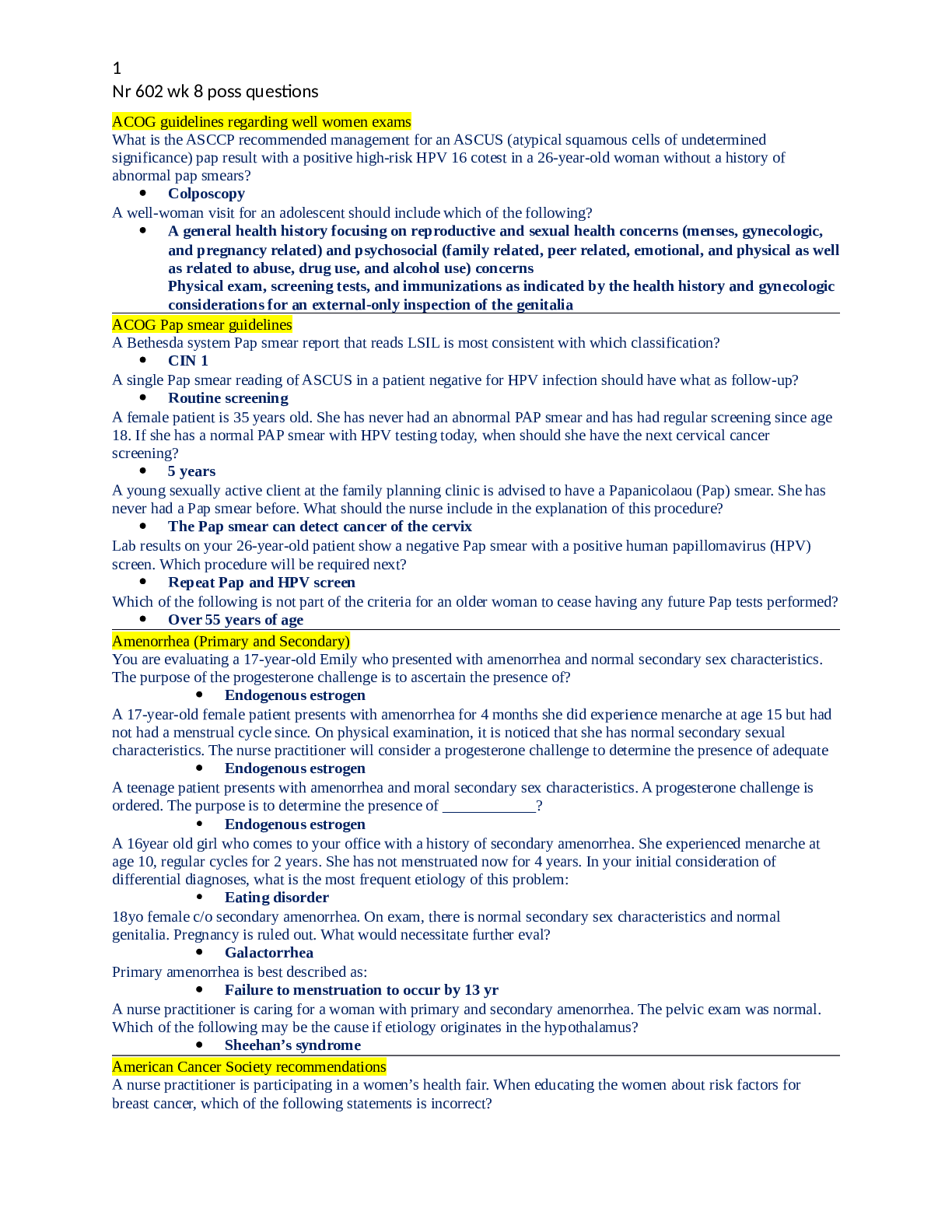

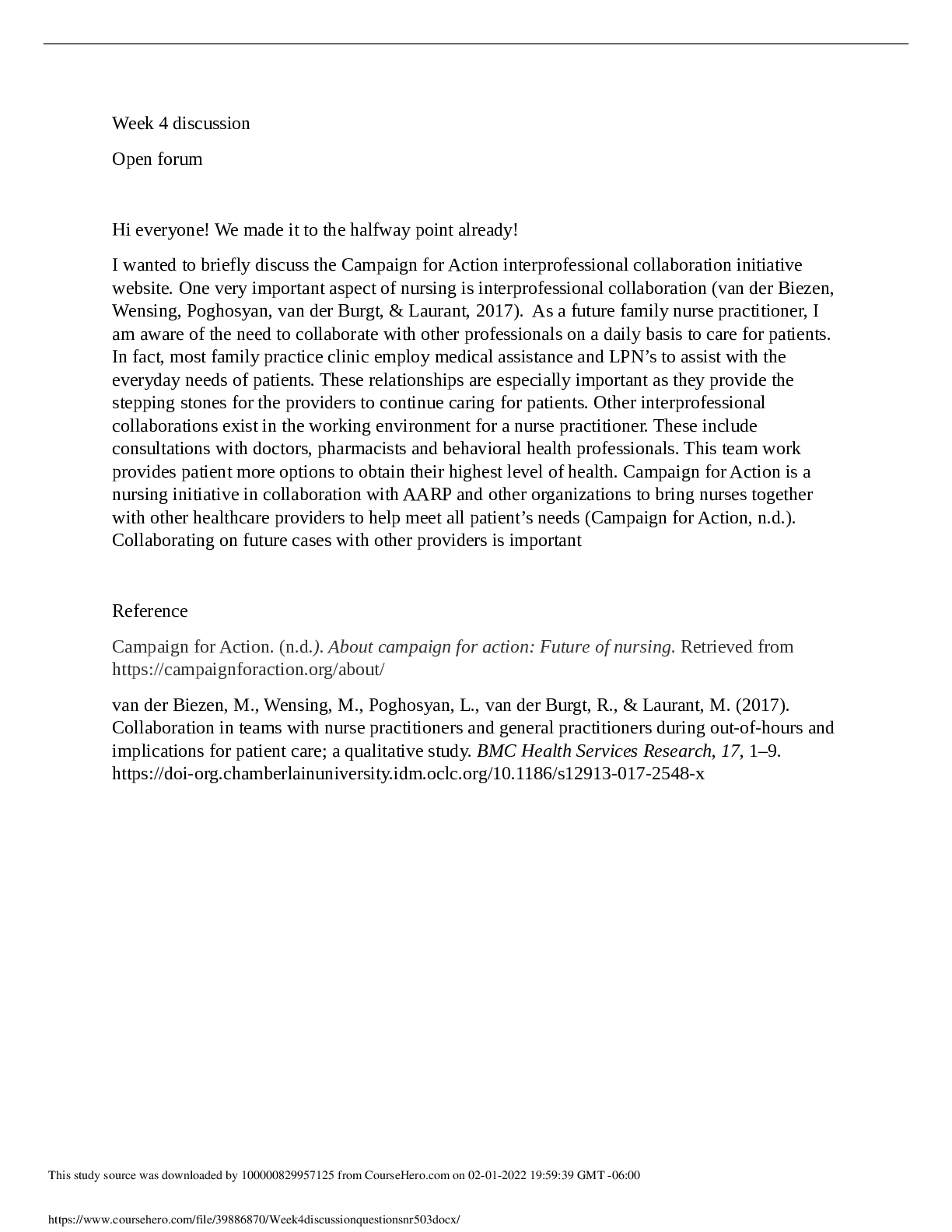
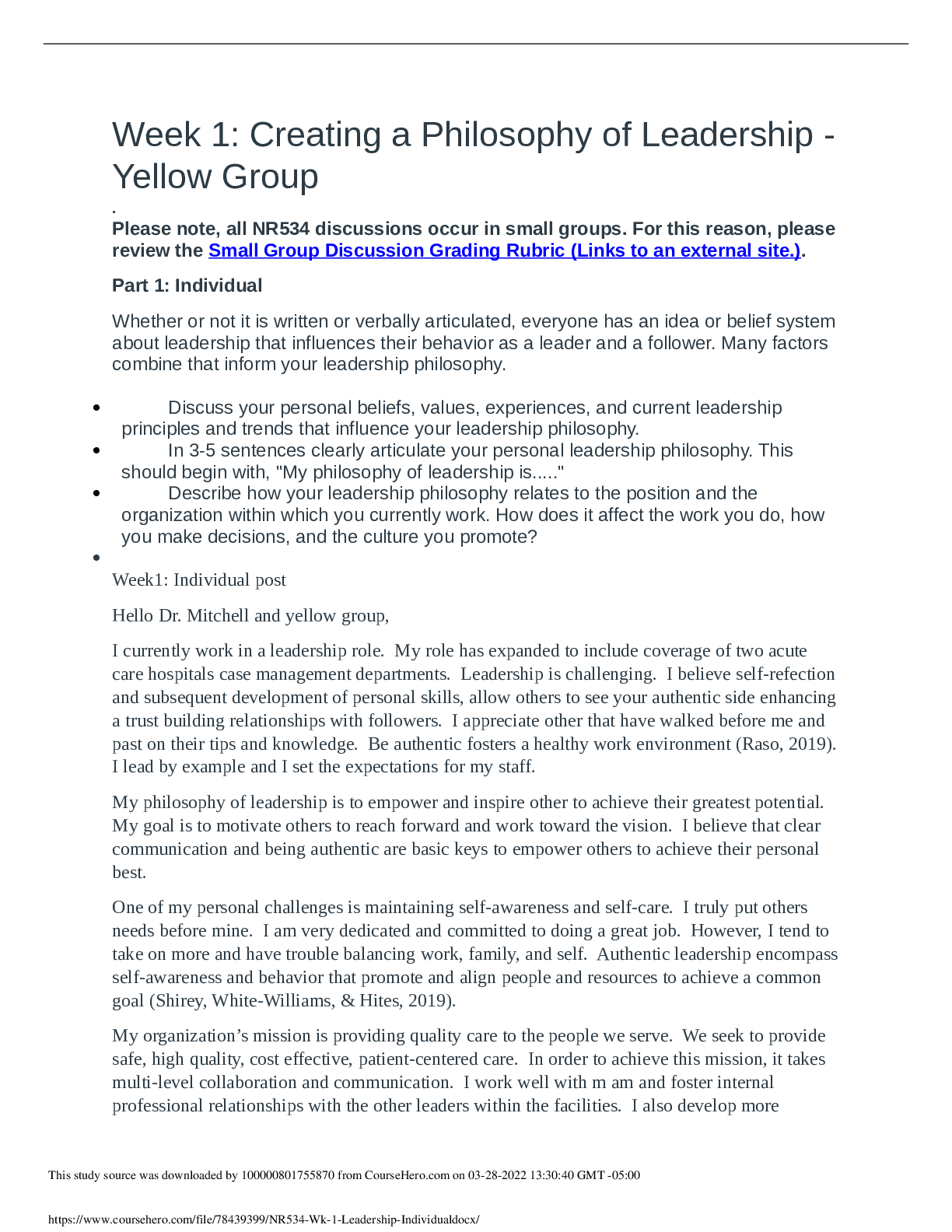
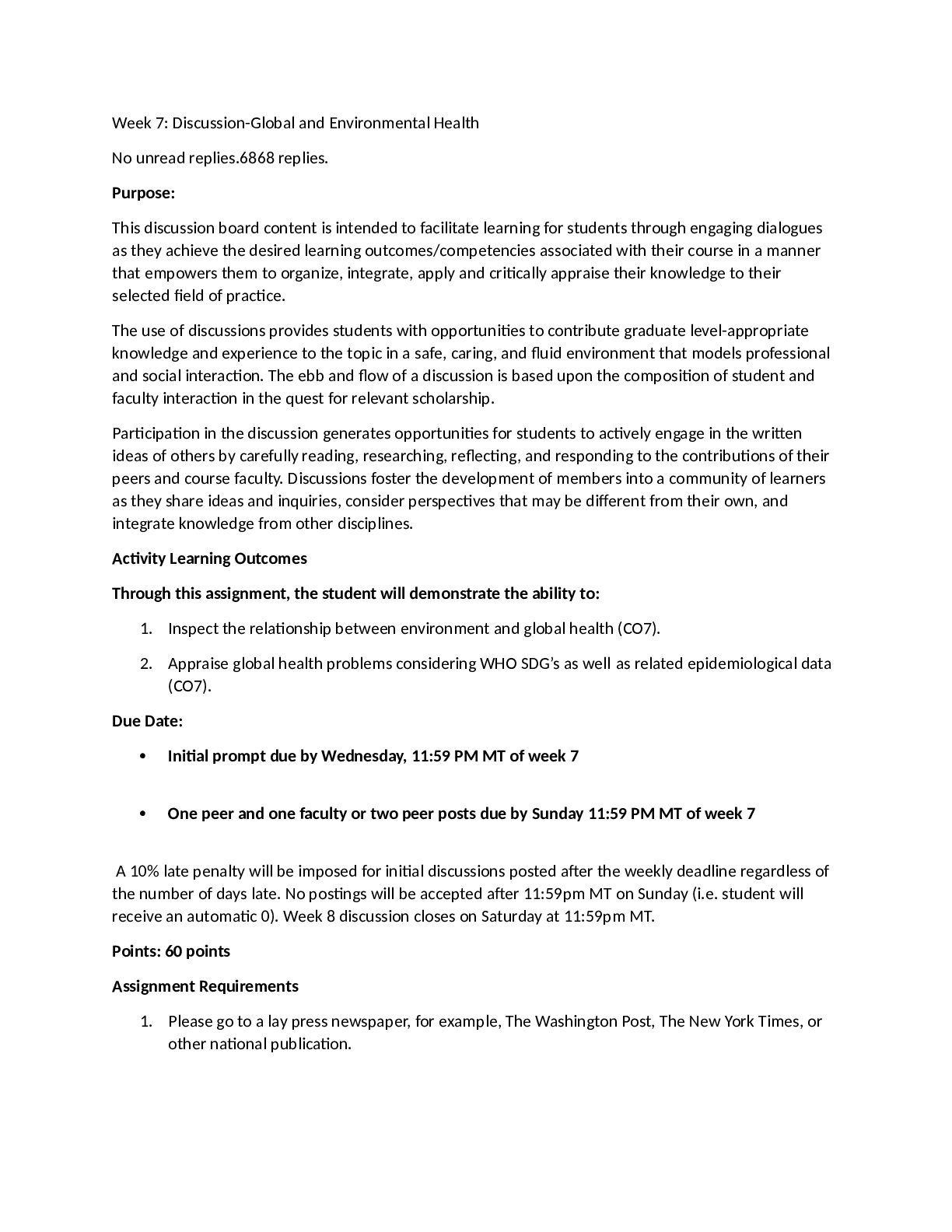


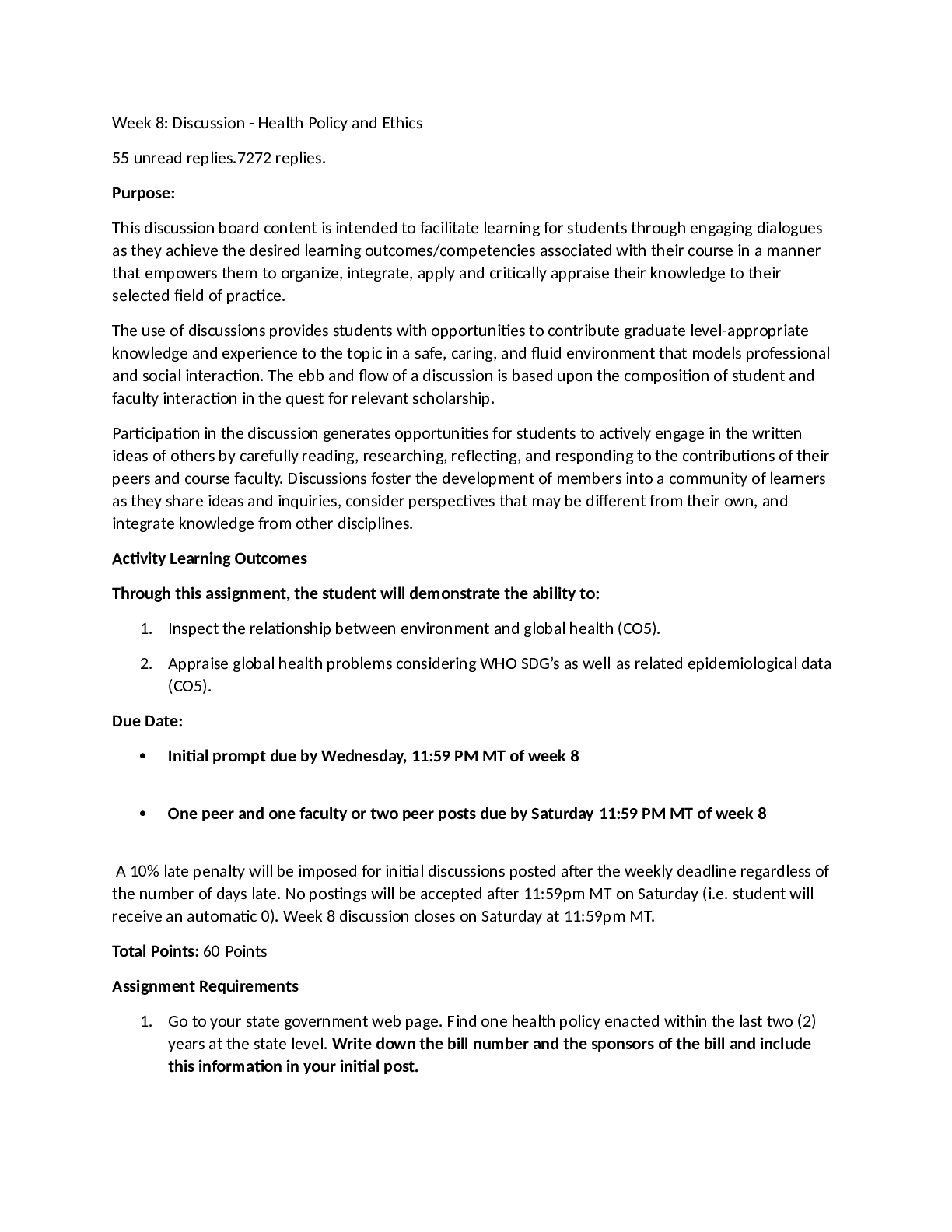
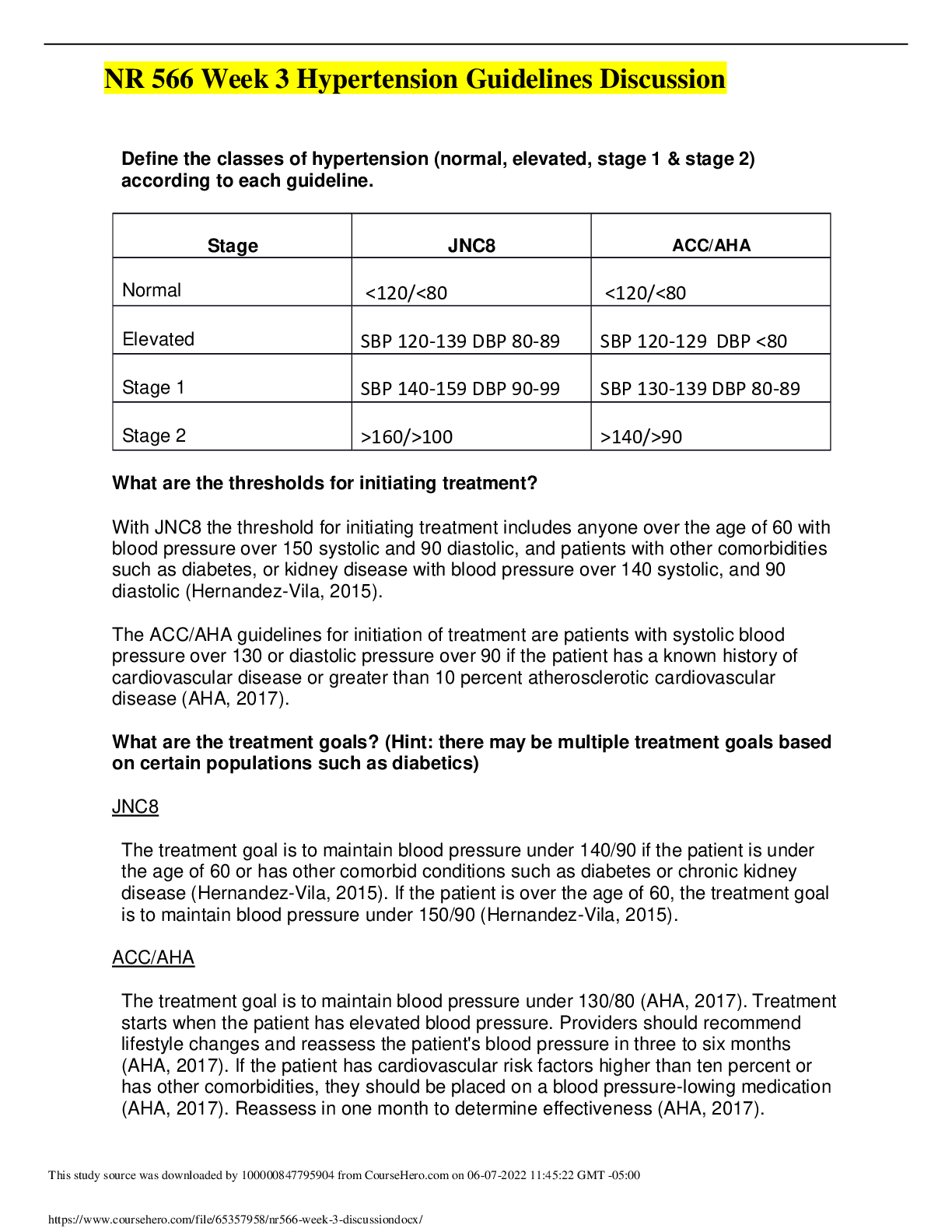
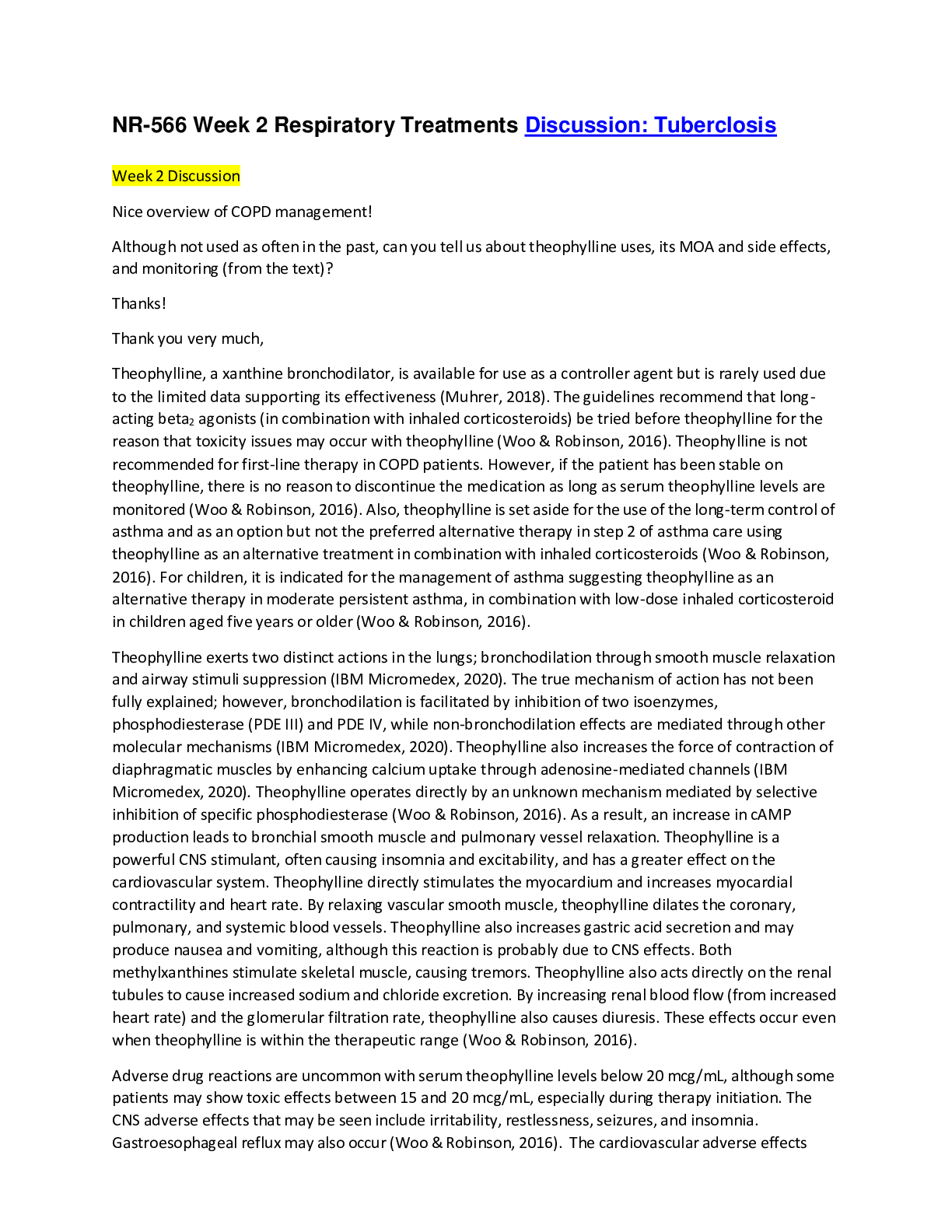
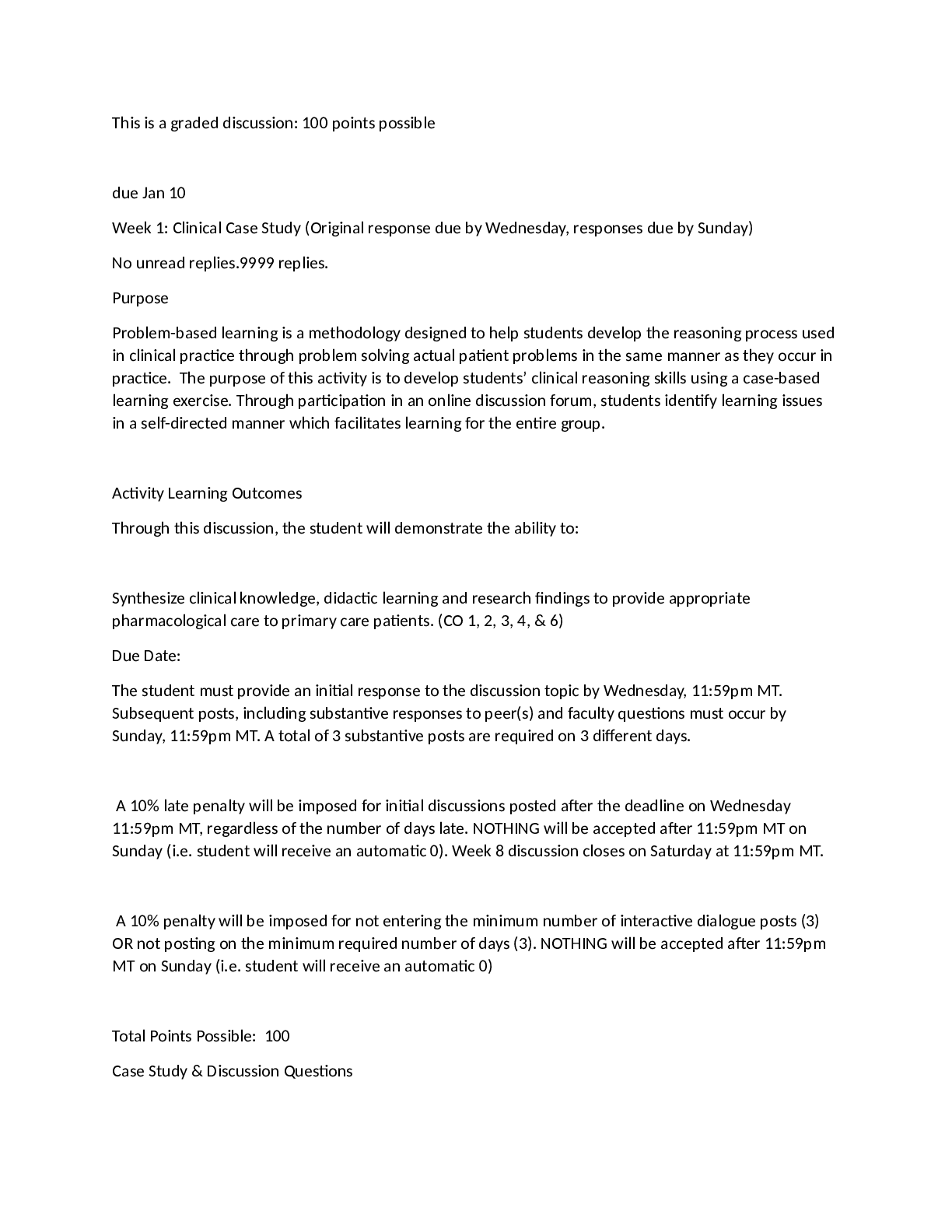
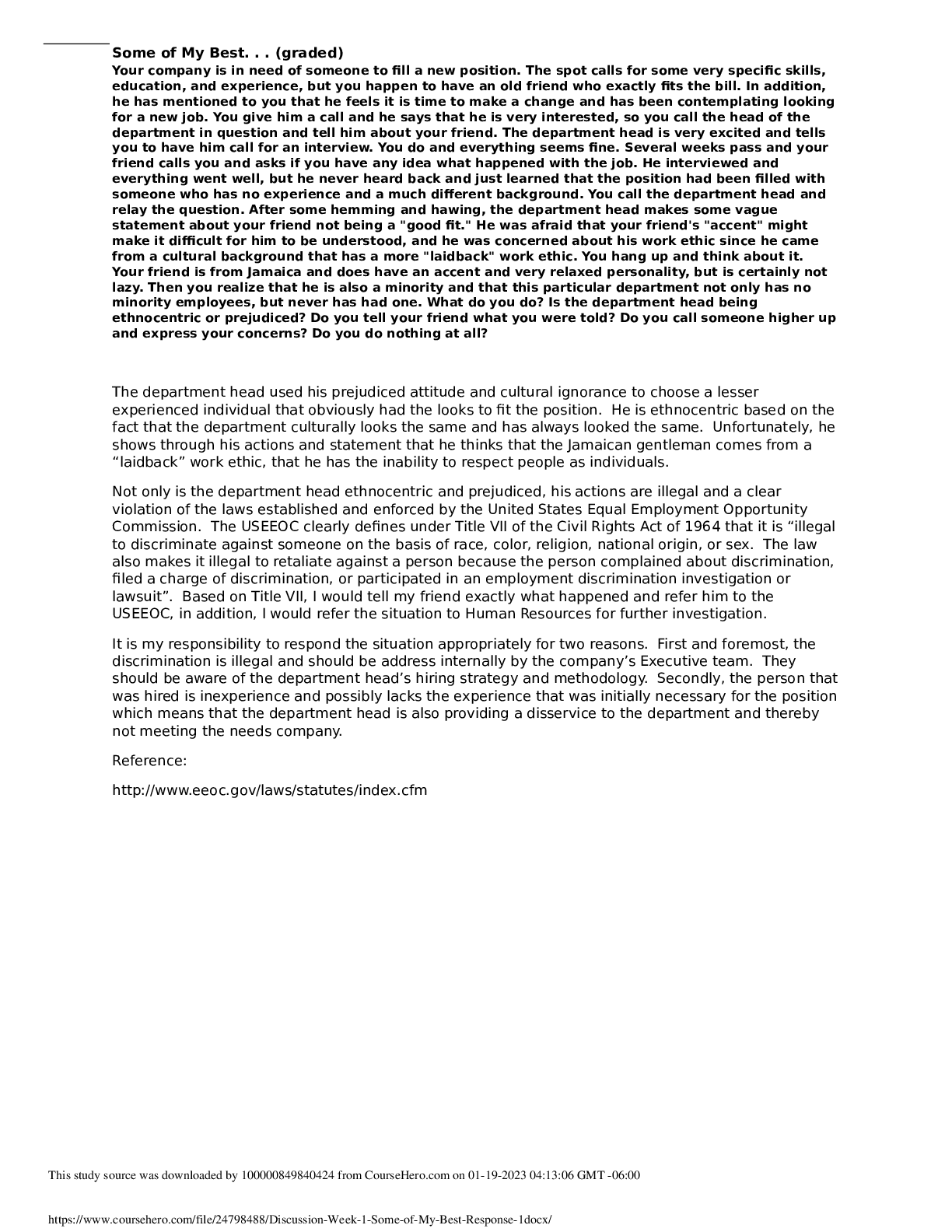


.png)
